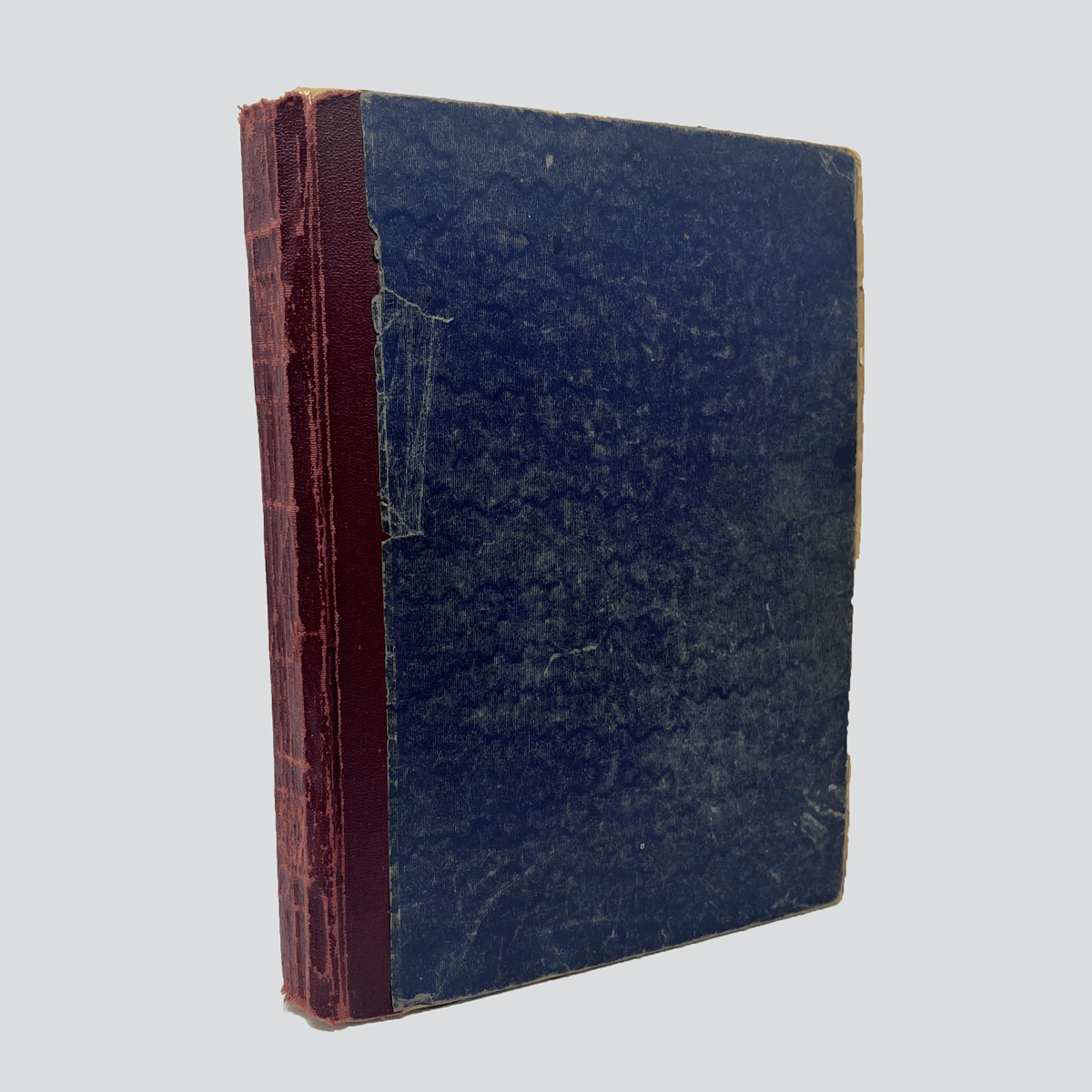 Image 1 of 32
Image 1 of 32

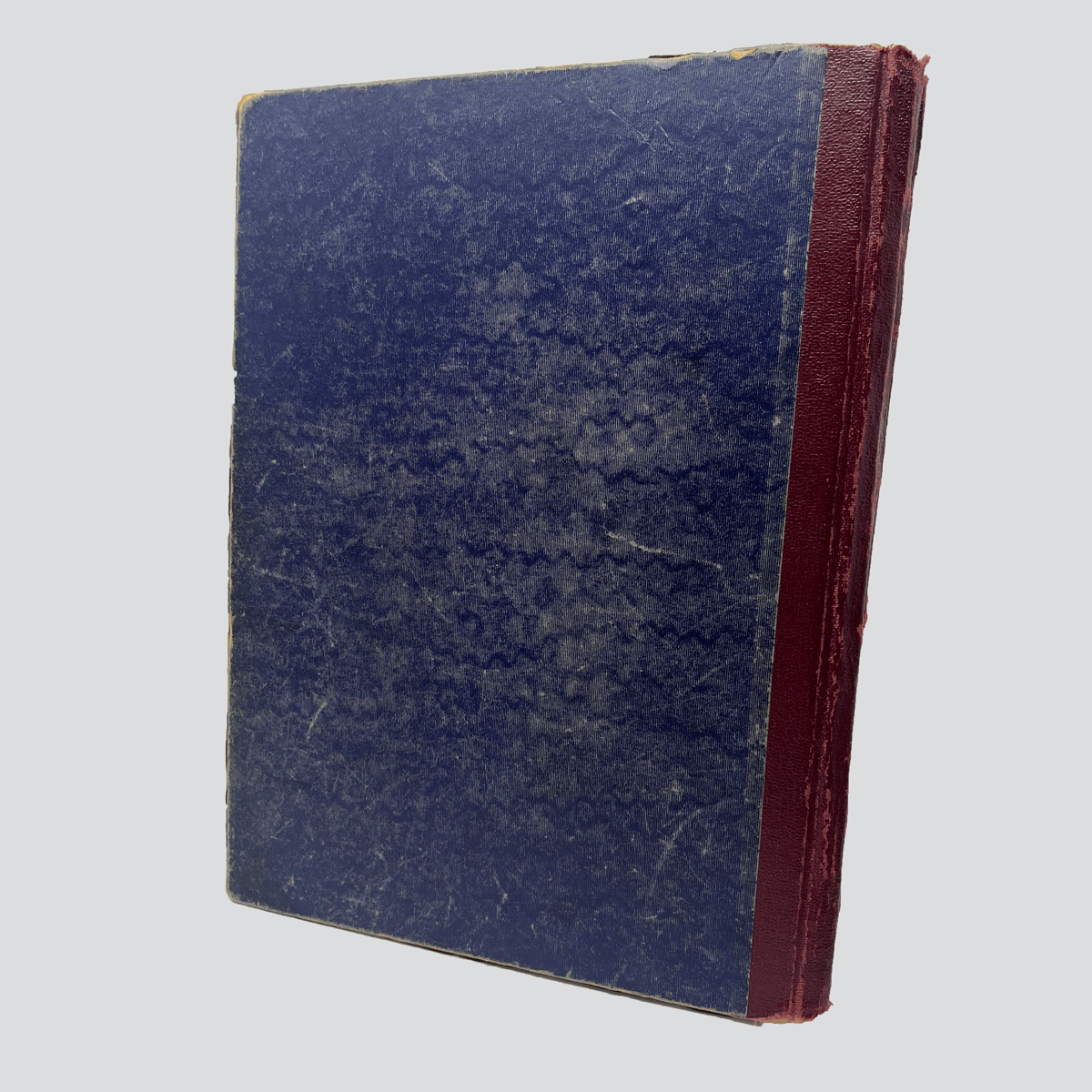 Image 2 of 32
Image 2 of 32

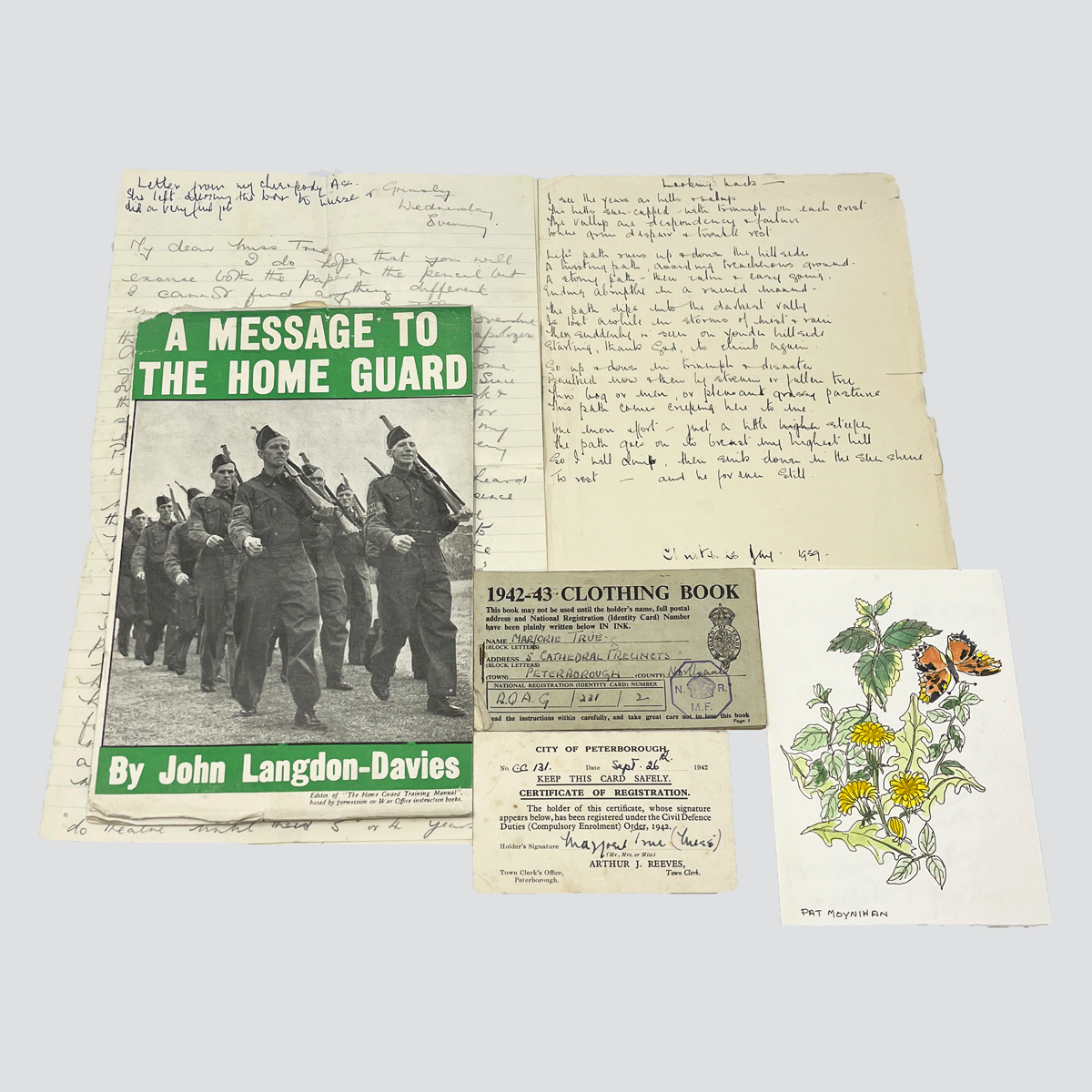 Image 3 of 32
Image 3 of 32

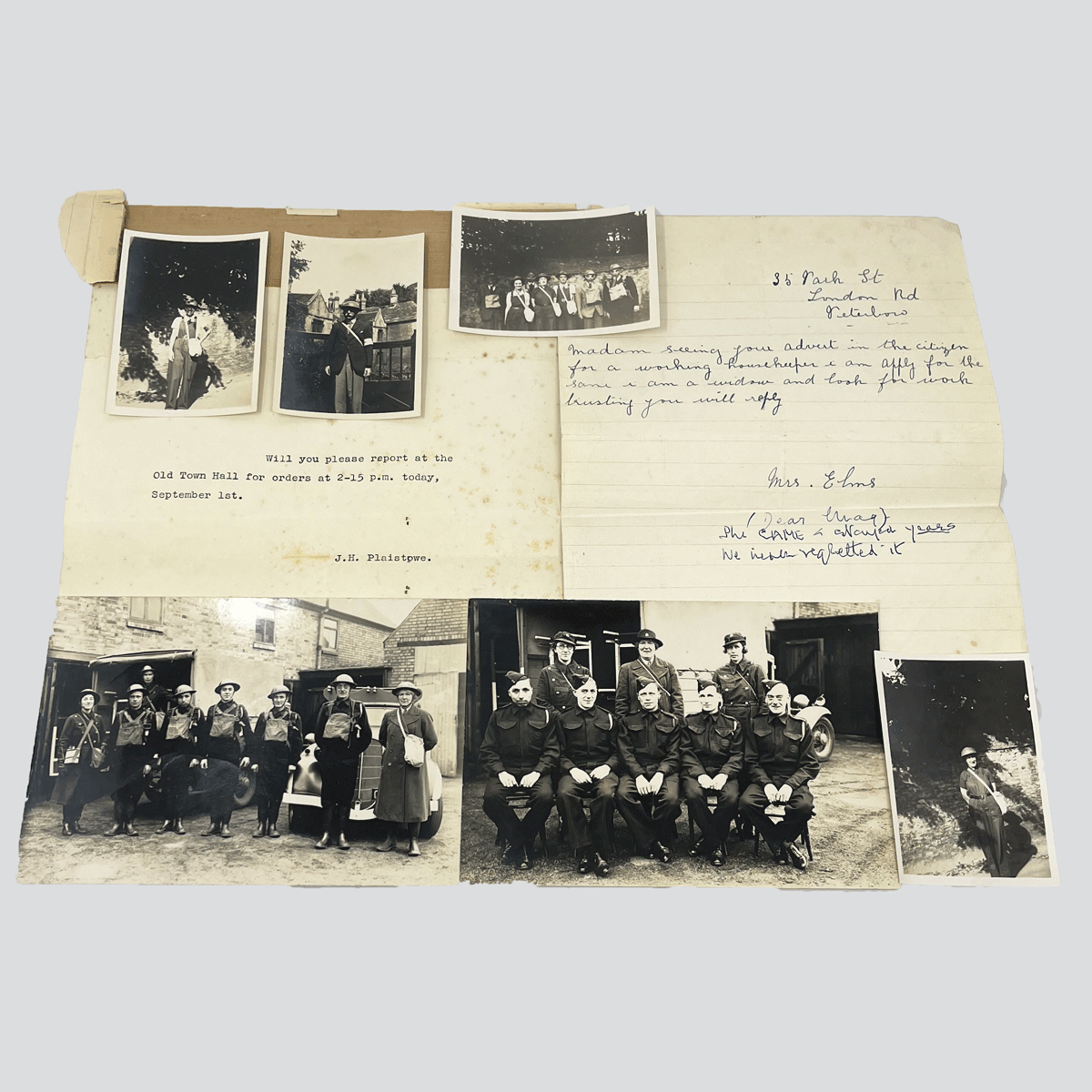 Image 4 of 32
Image 4 of 32

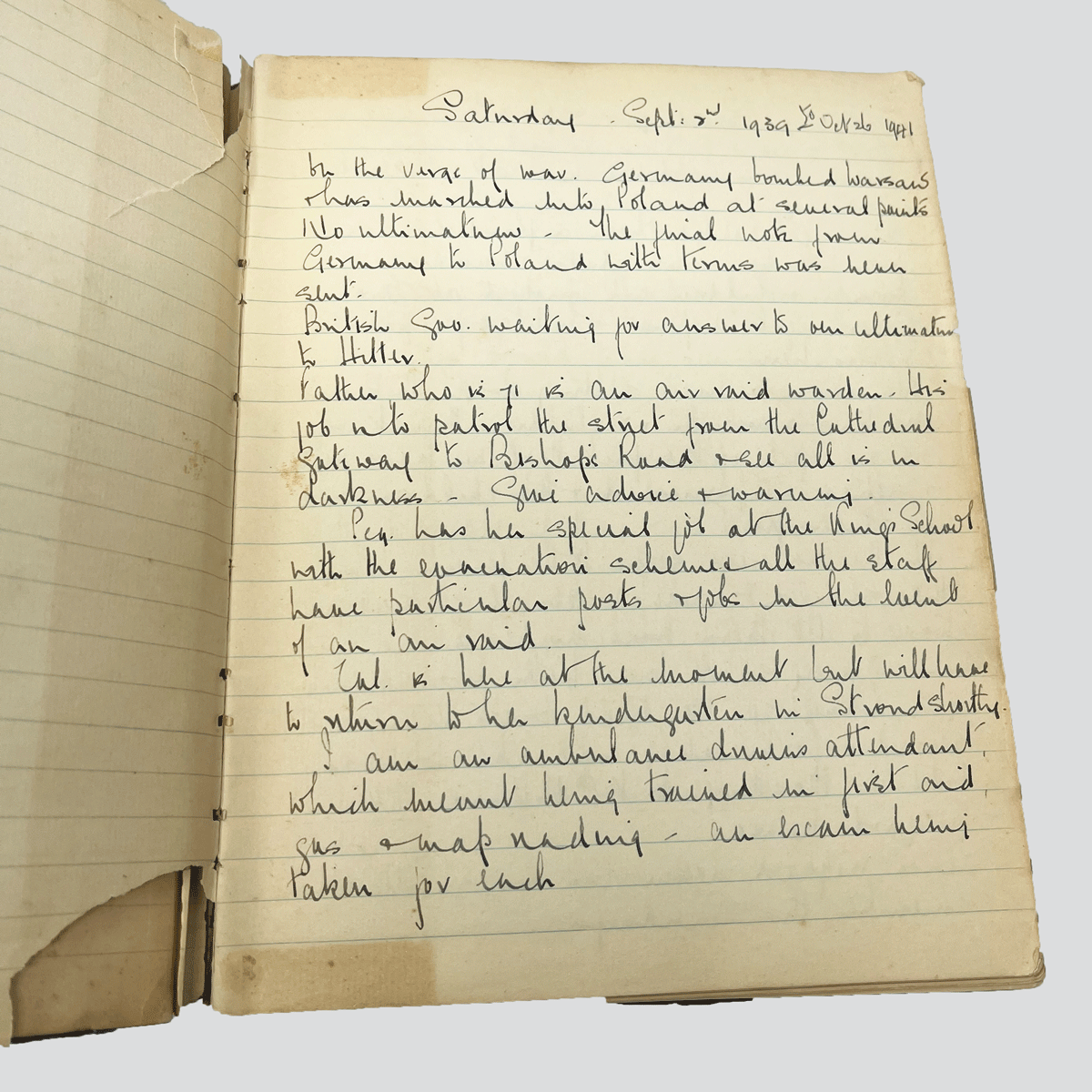 Image 5 of 32
Image 5 of 32

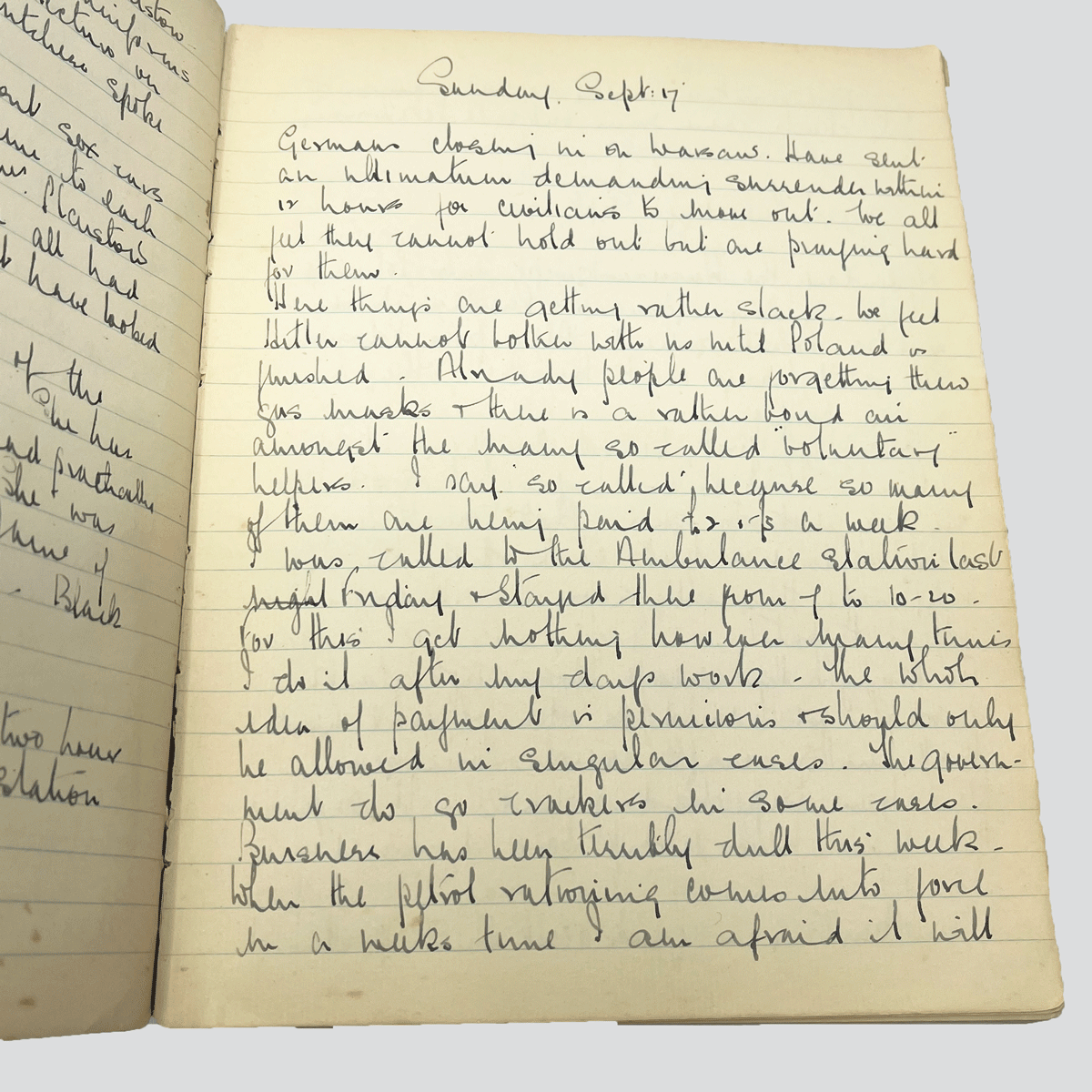 Image 6 of 32
Image 6 of 32

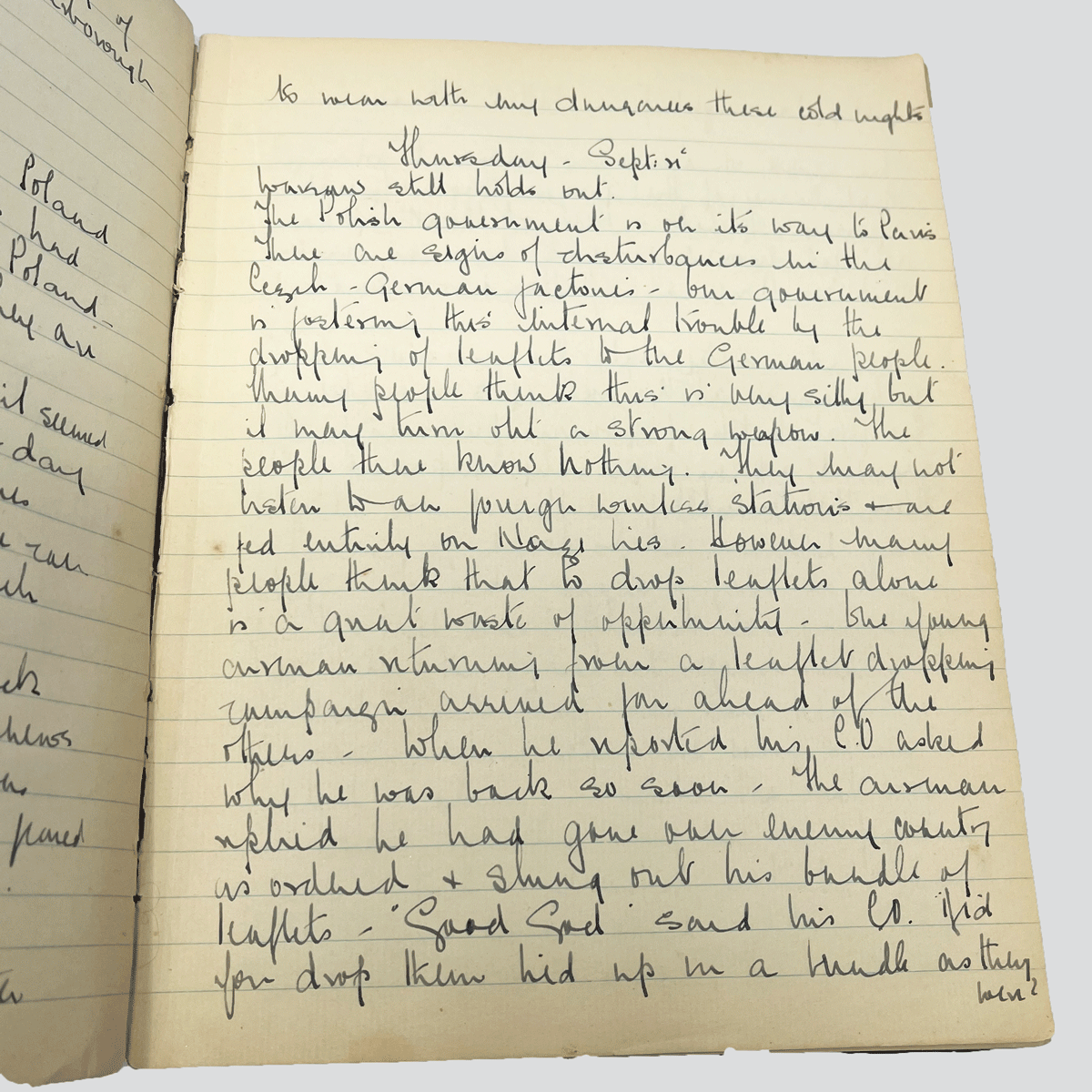 Image 7 of 32
Image 7 of 32

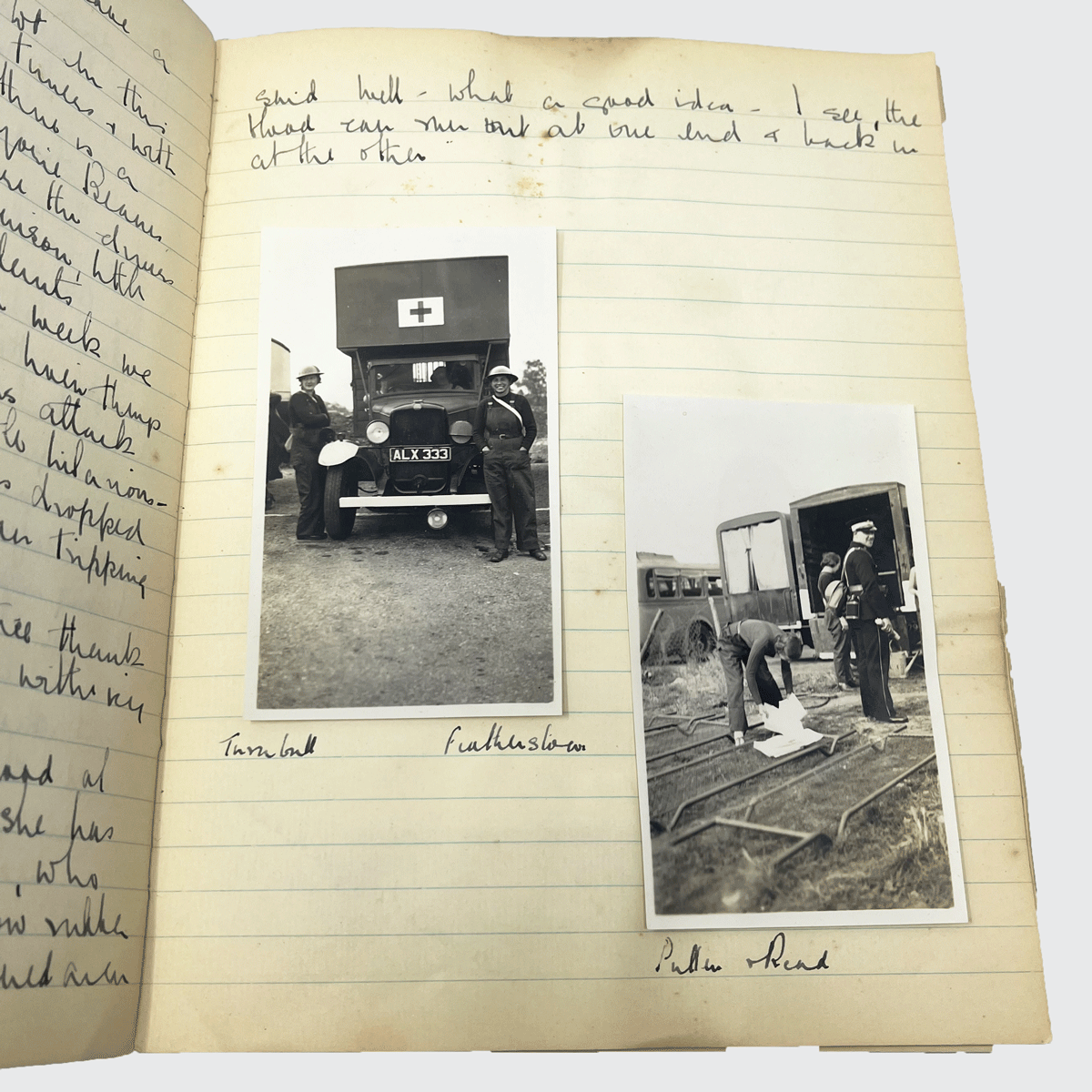 Image 8 of 32
Image 8 of 32

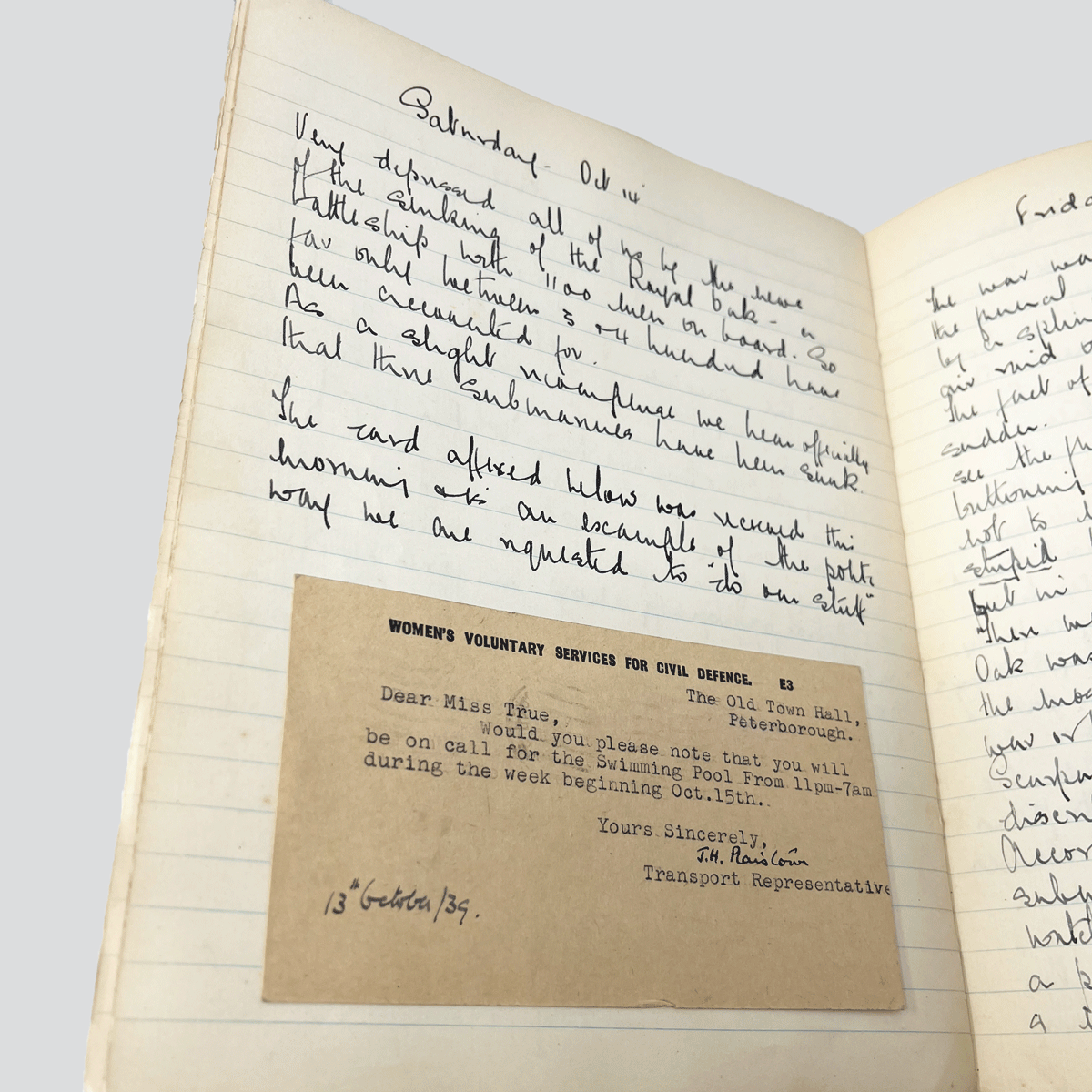 Image 9 of 32
Image 9 of 32

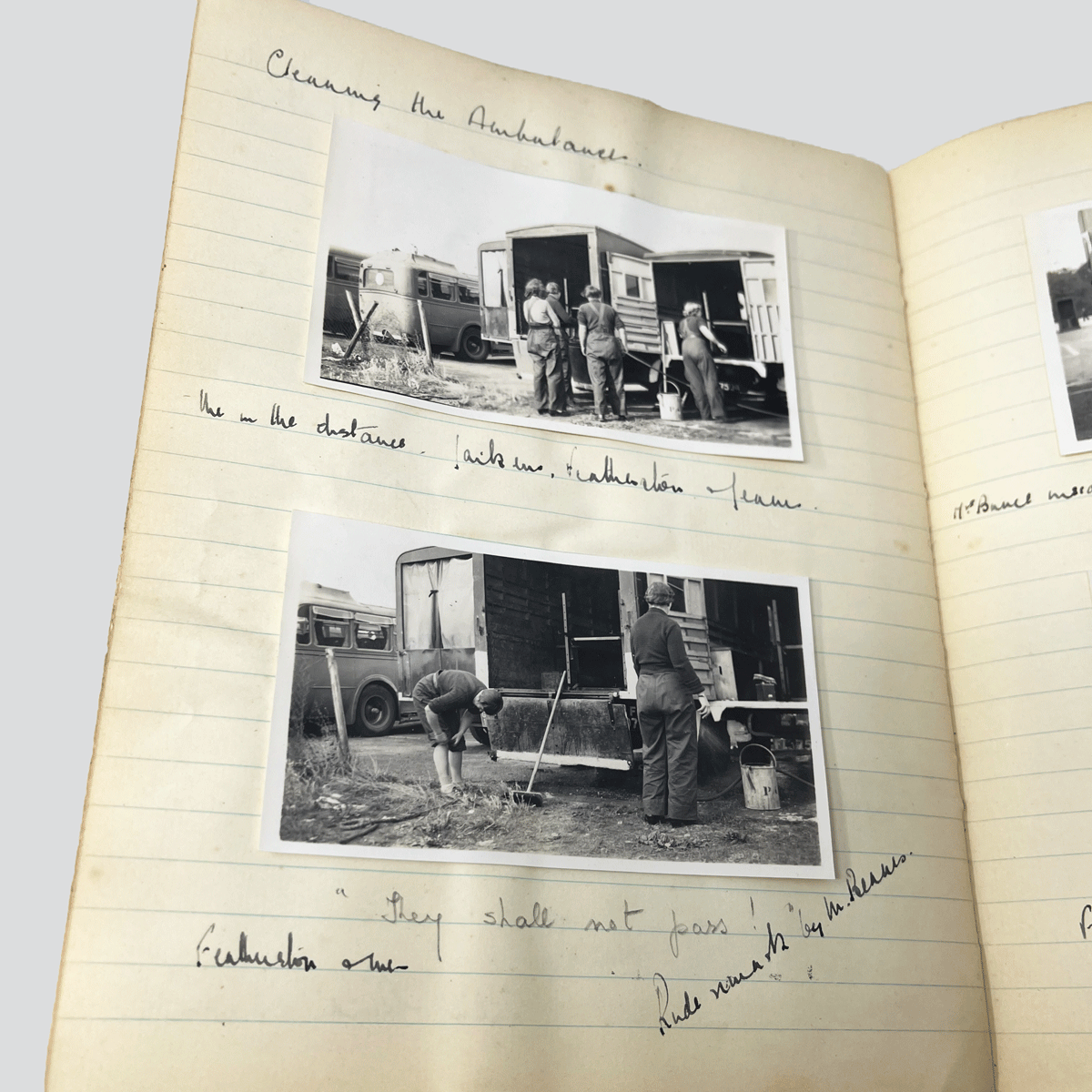 Image 10 of 32
Image 10 of 32

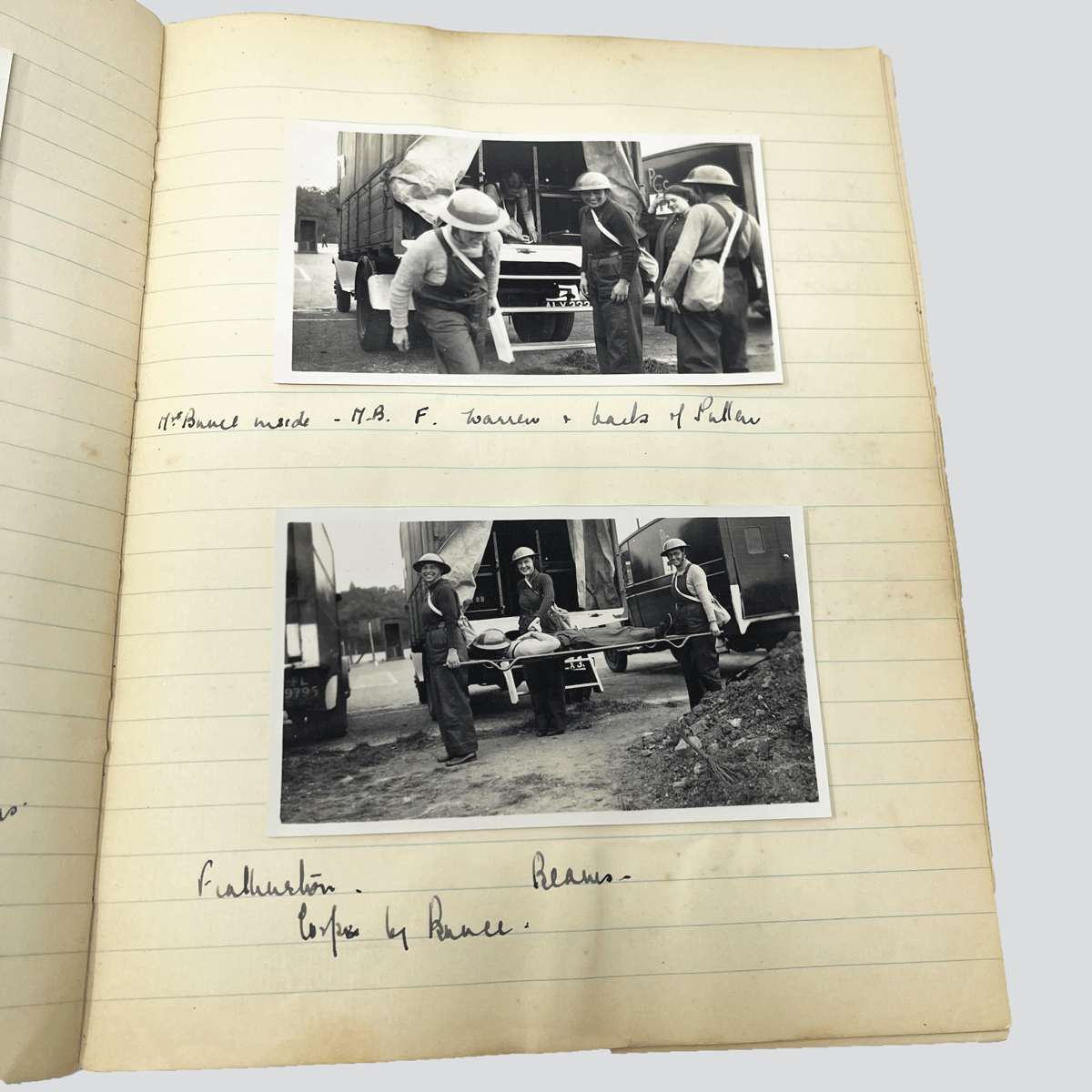 Image 11 of 32
Image 11 of 32

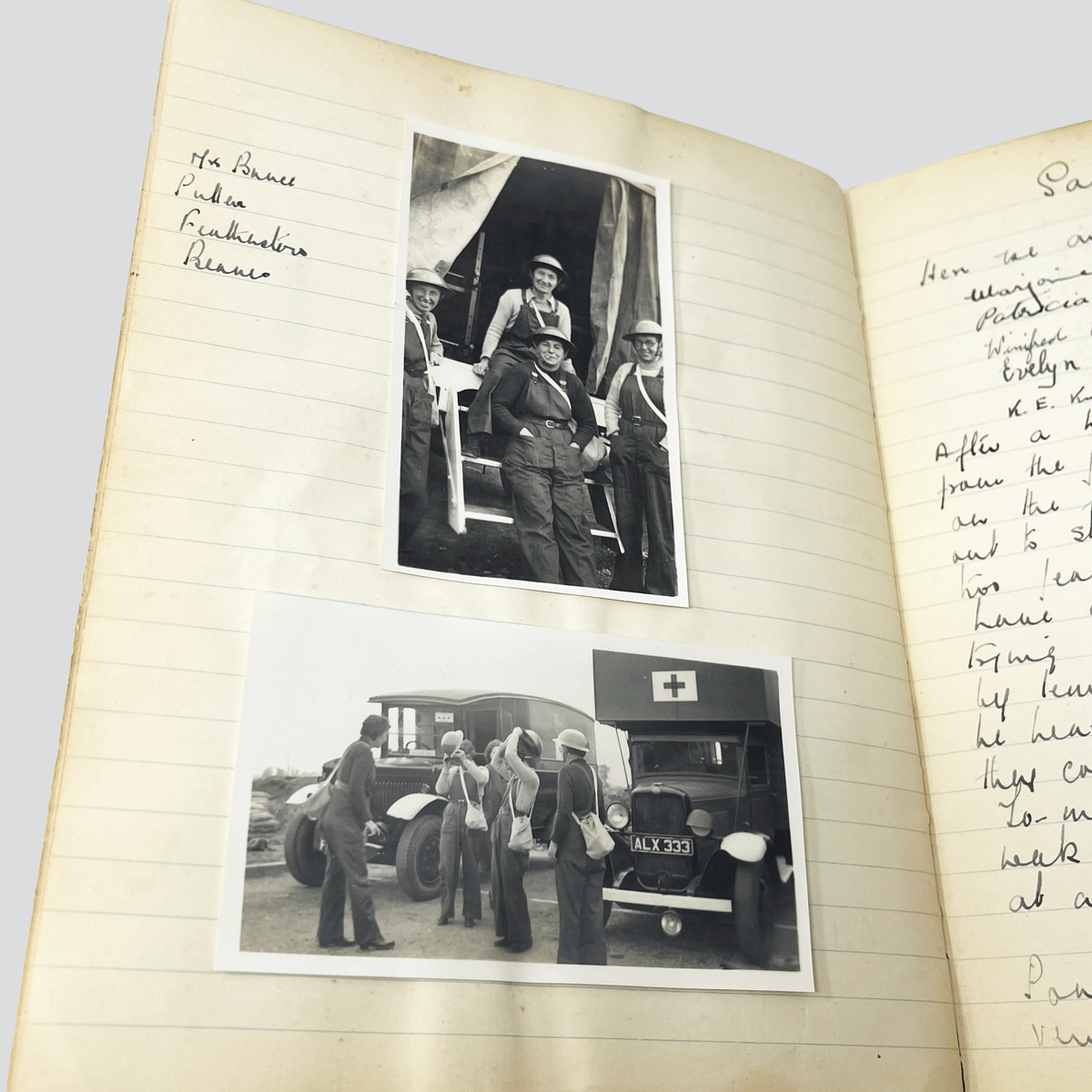 Image 12 of 32
Image 12 of 32

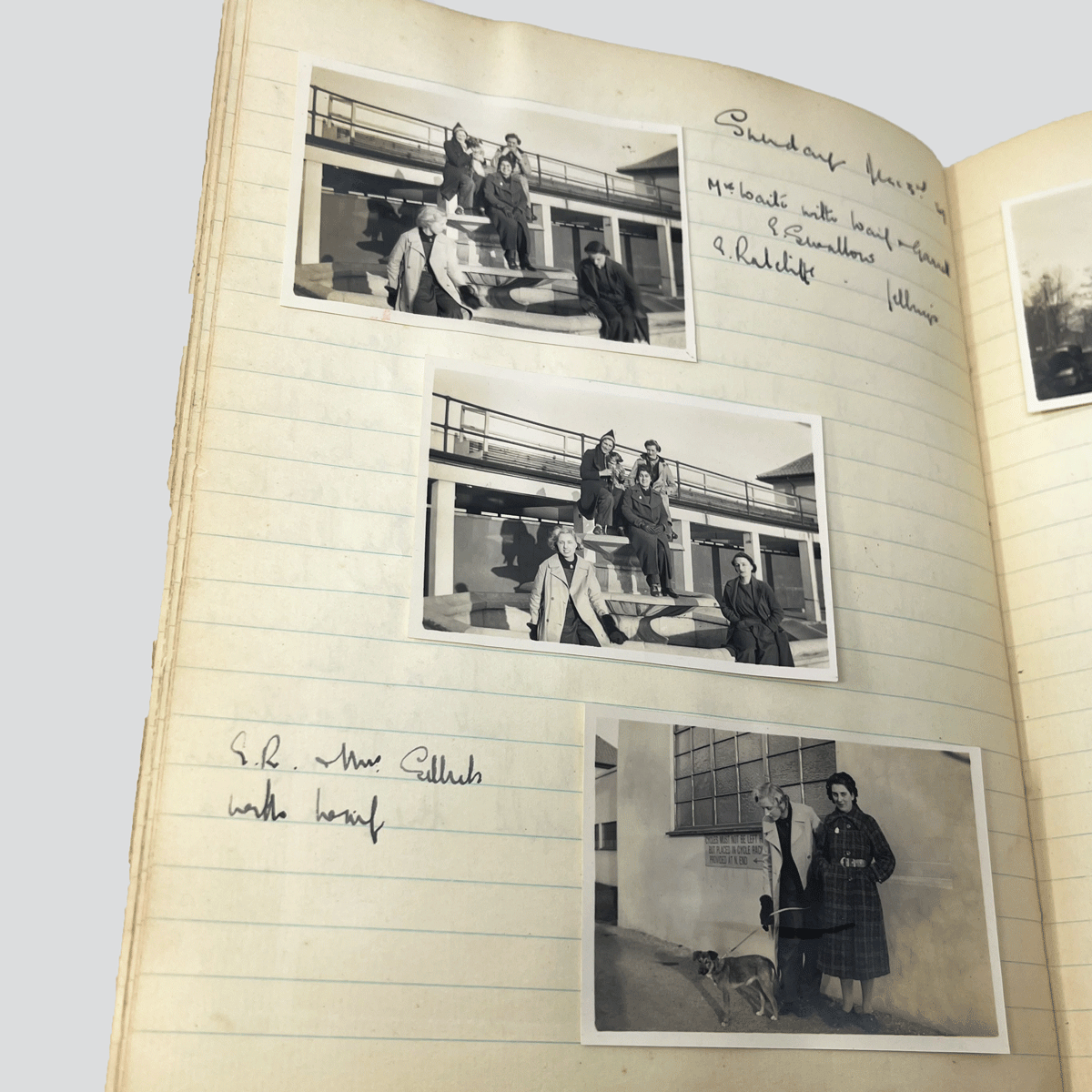 Image 13 of 32
Image 13 of 32

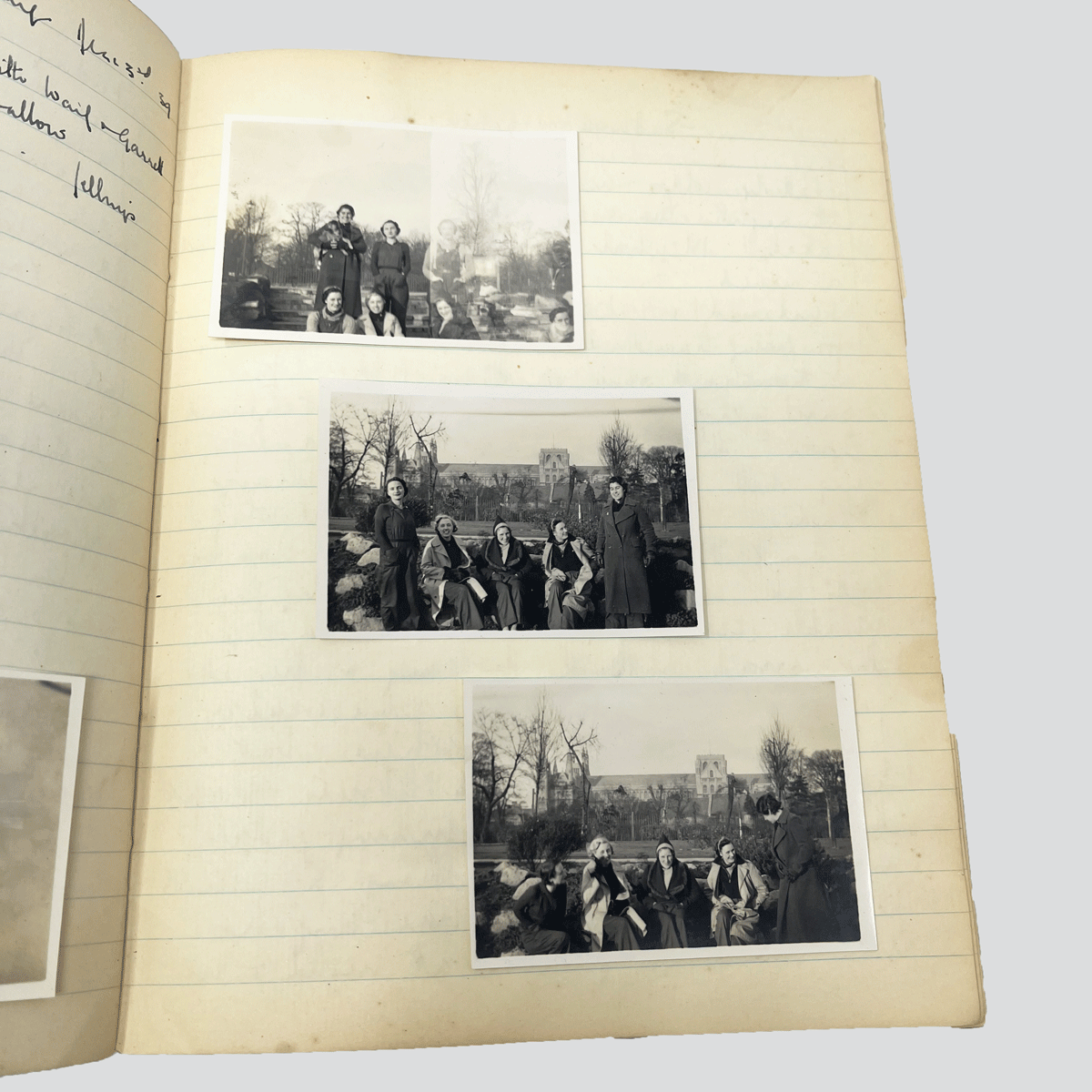 Image 14 of 32
Image 14 of 32

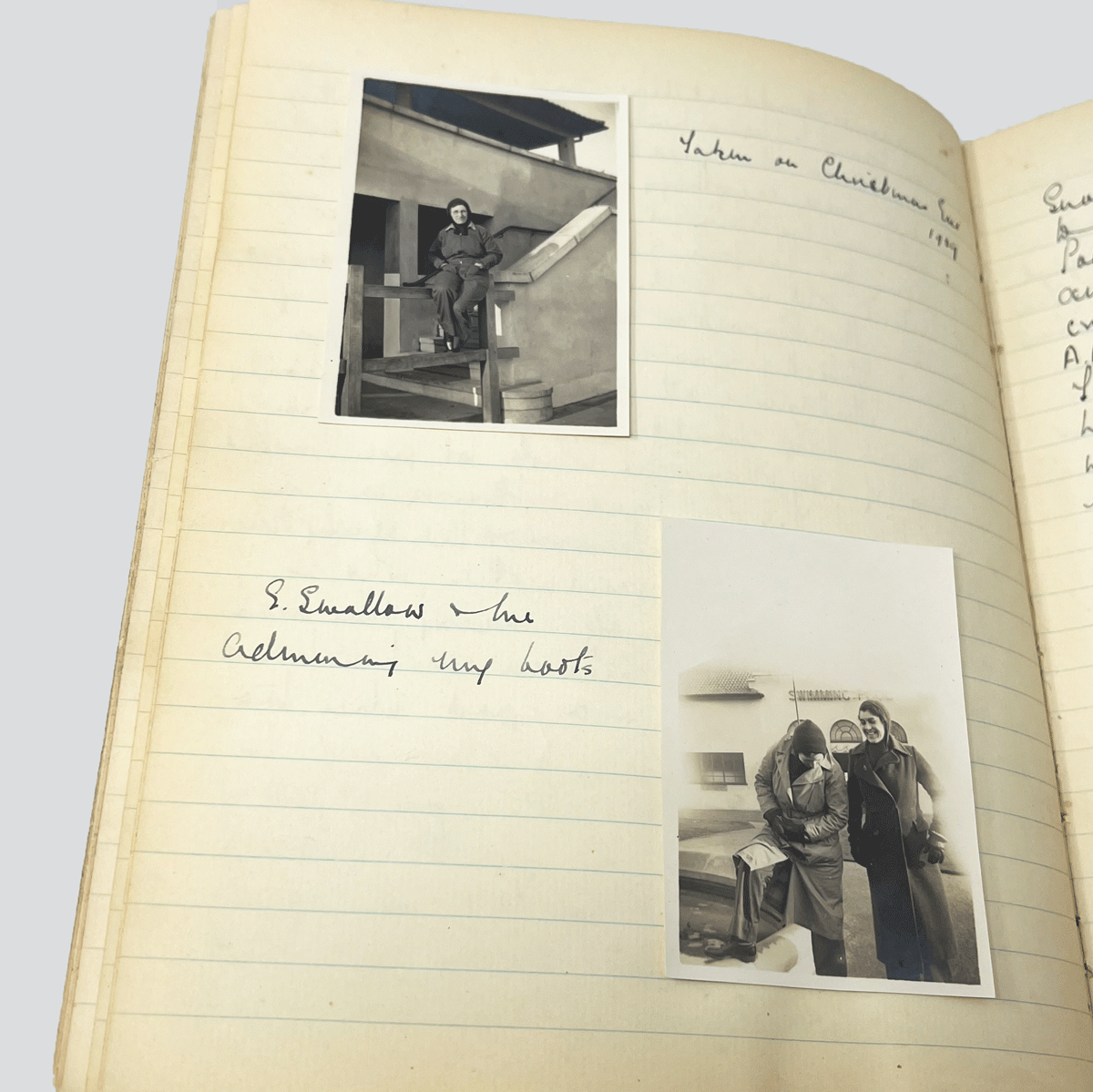 Image 15 of 32
Image 15 of 32

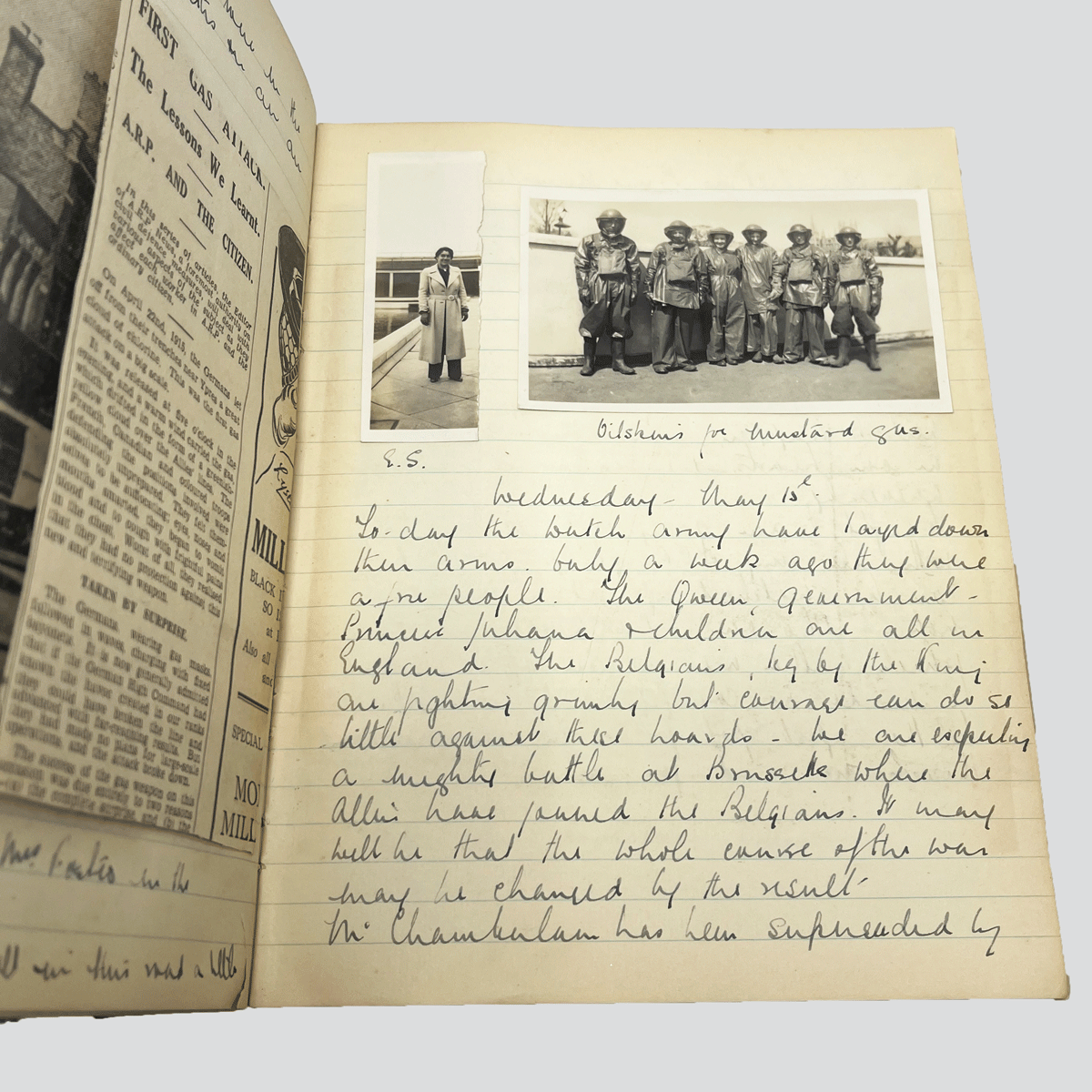 Image 16 of 32
Image 16 of 32

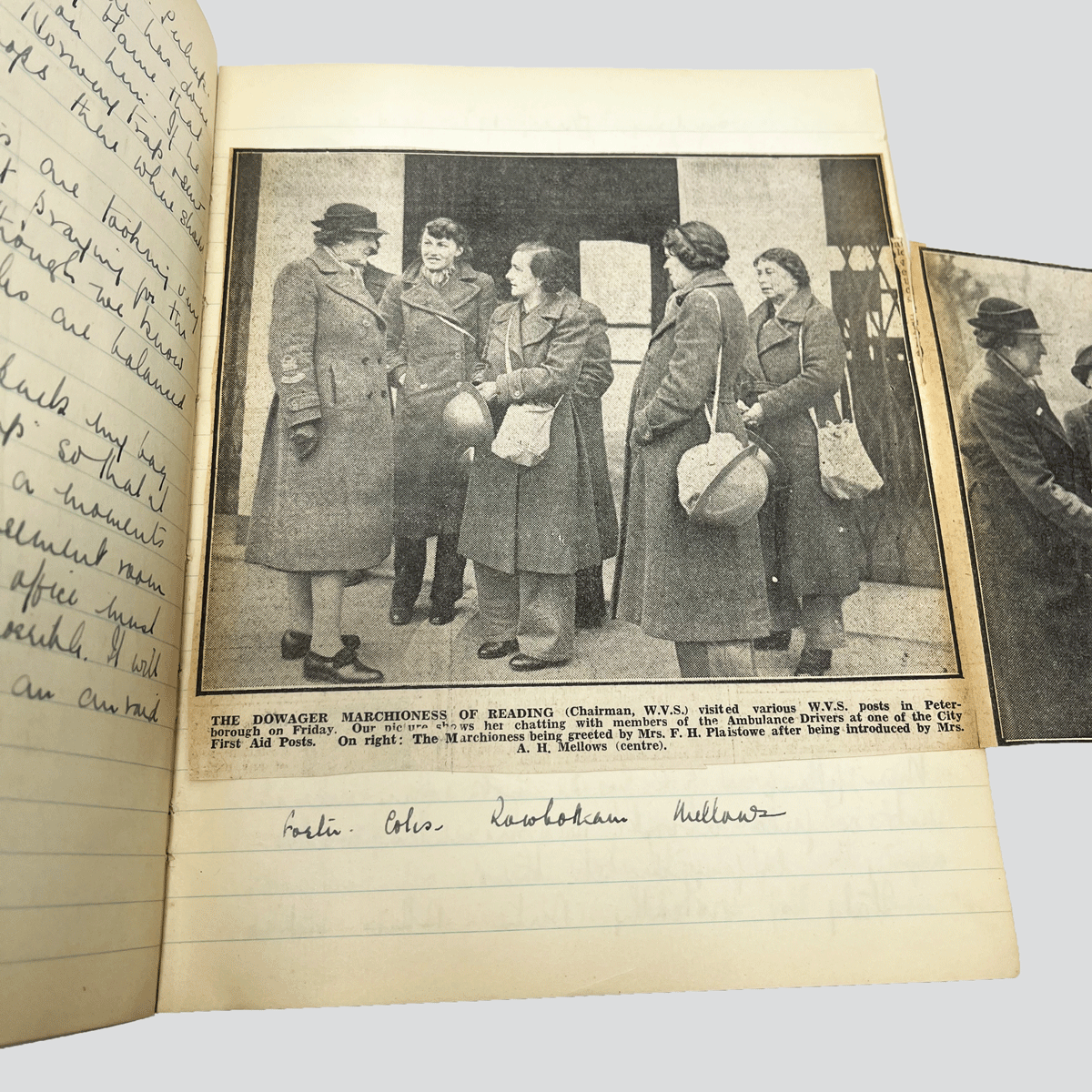 Image 17 of 32
Image 17 of 32

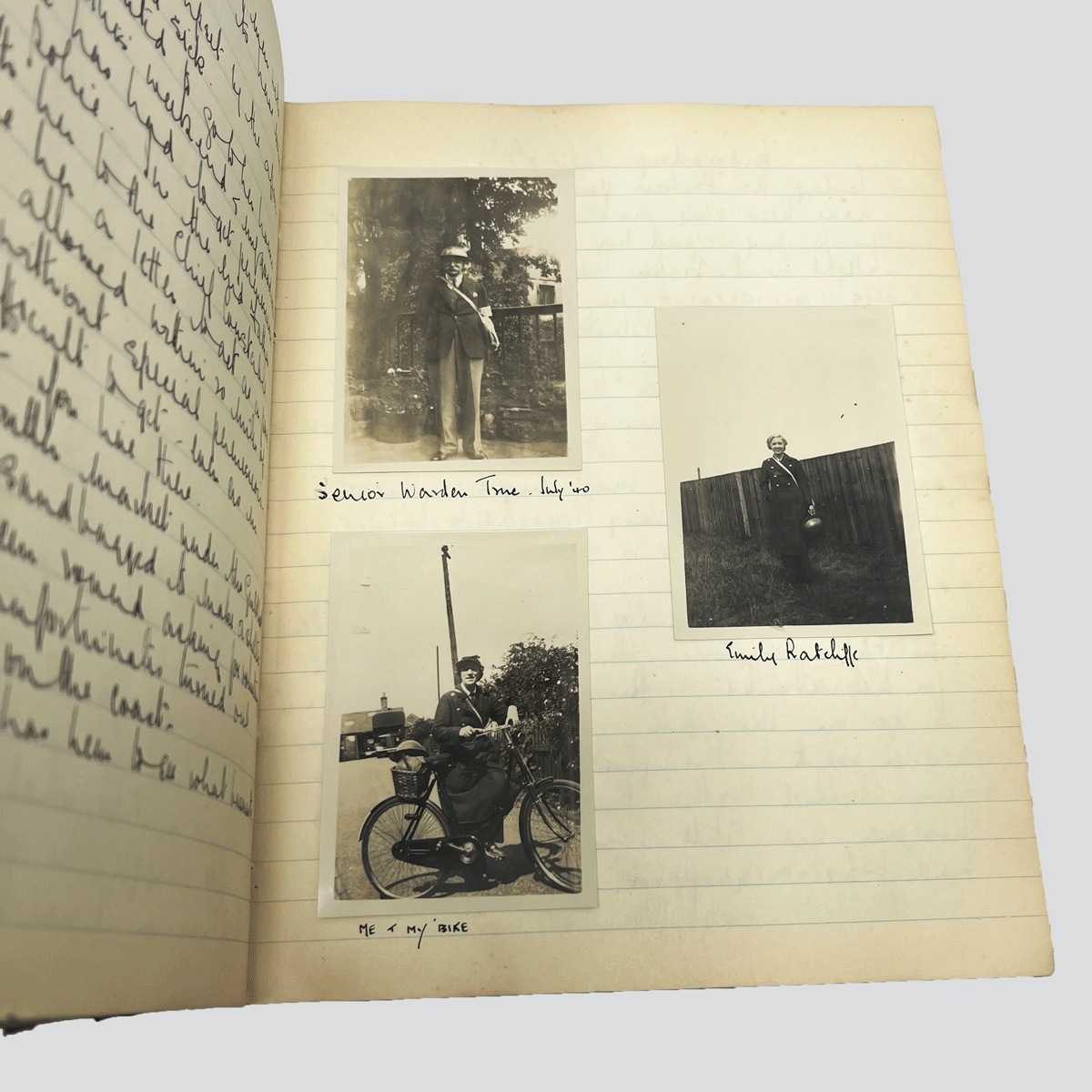 Image 18 of 32
Image 18 of 32

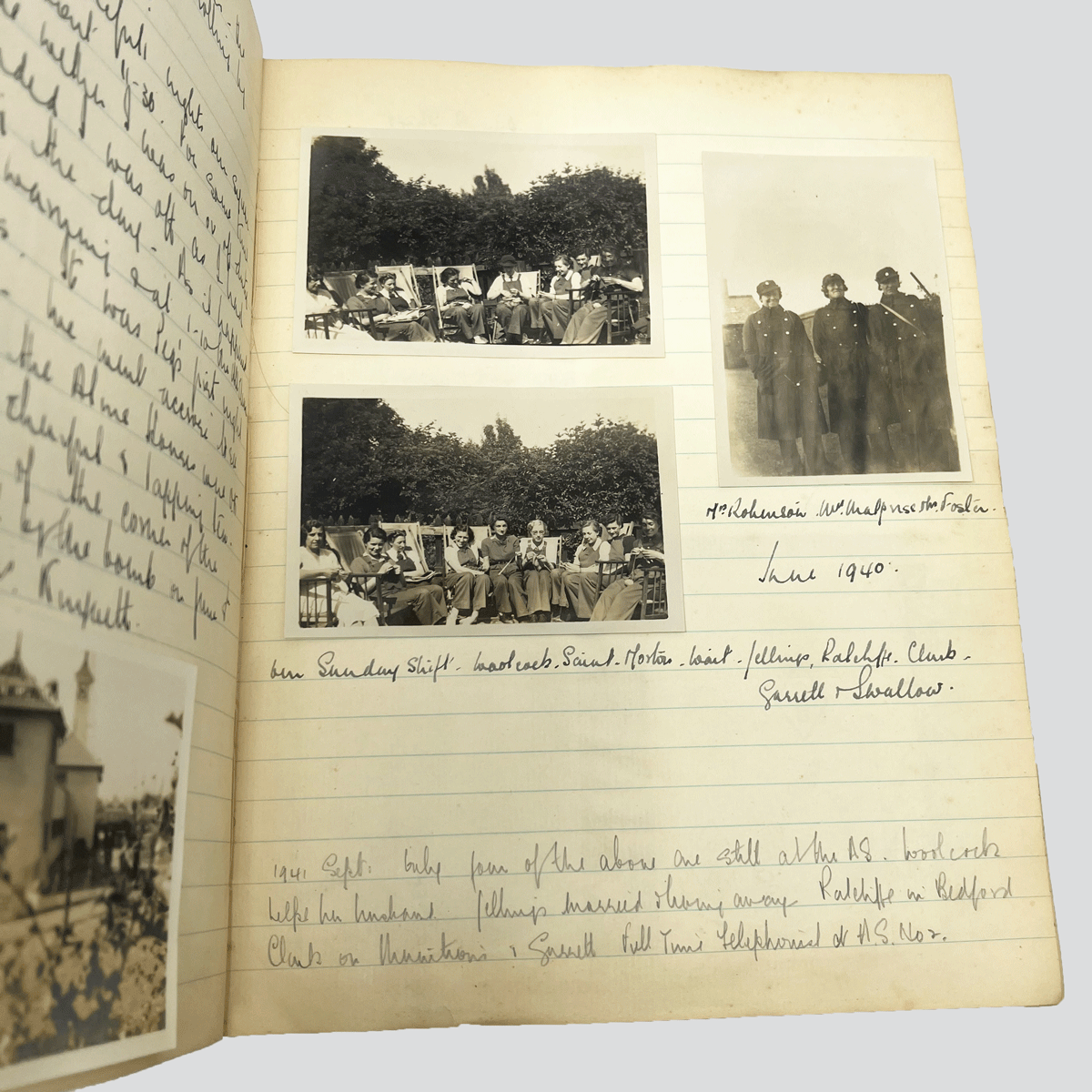 Image 19 of 32
Image 19 of 32

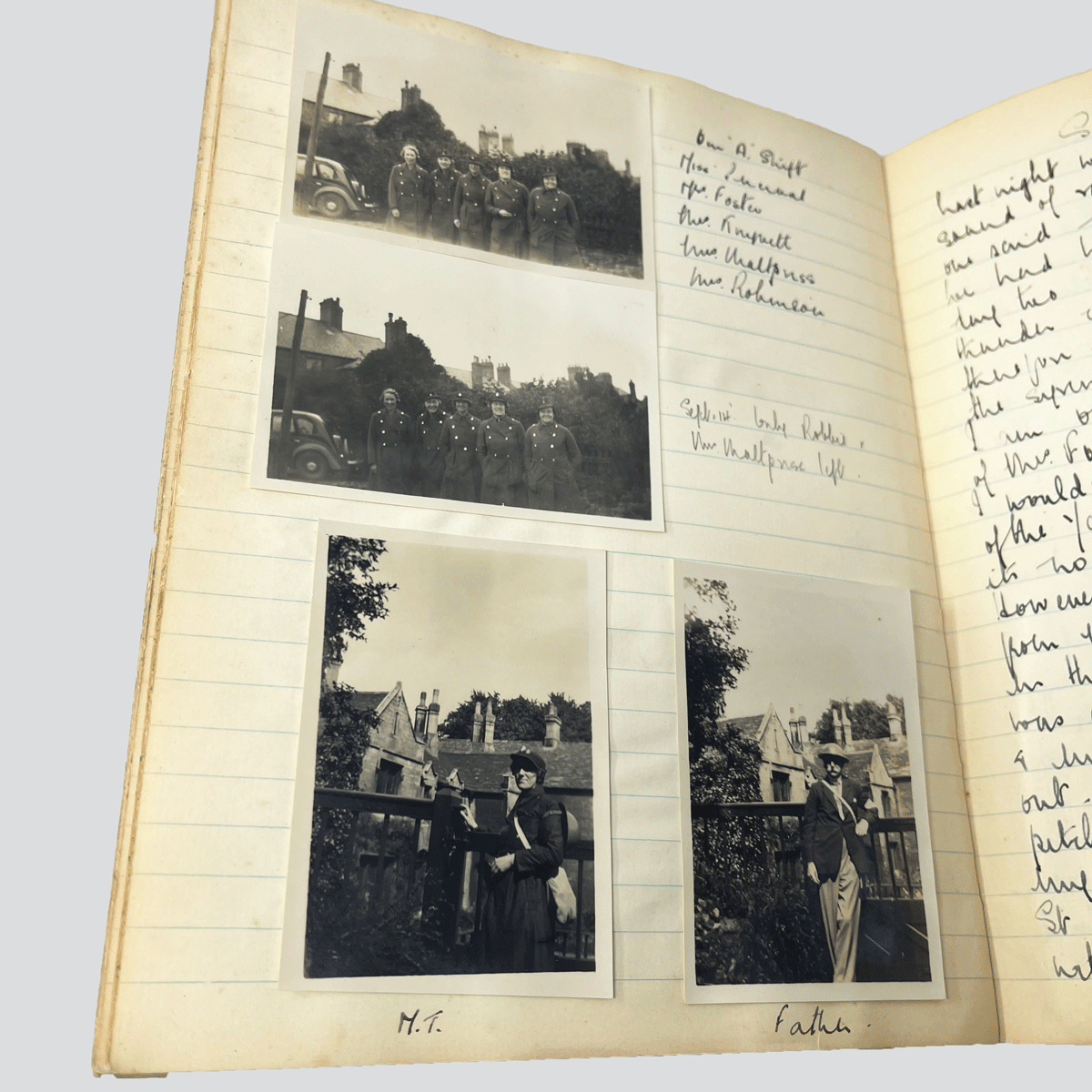 Image 20 of 32
Image 20 of 32

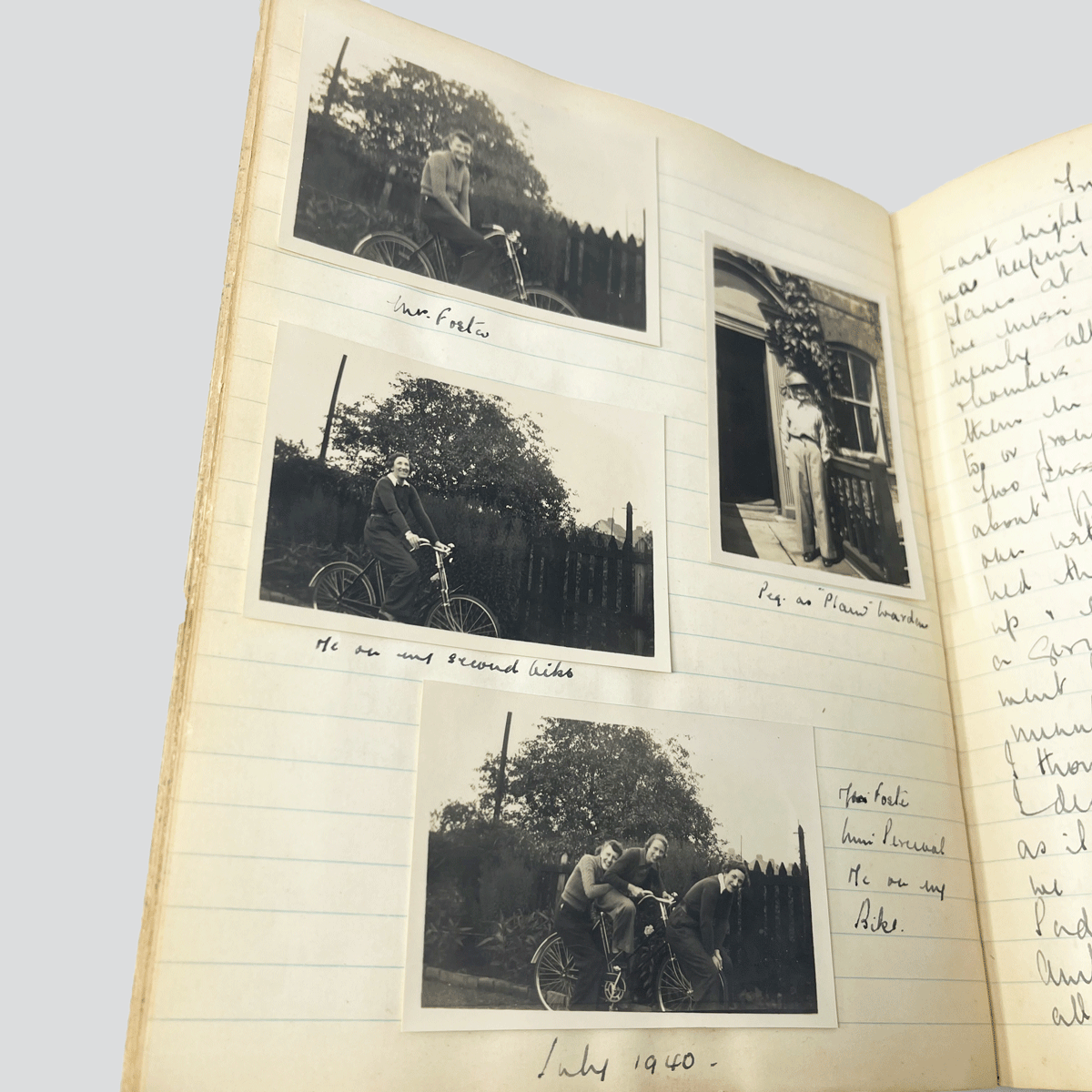 Image 21 of 32
Image 21 of 32

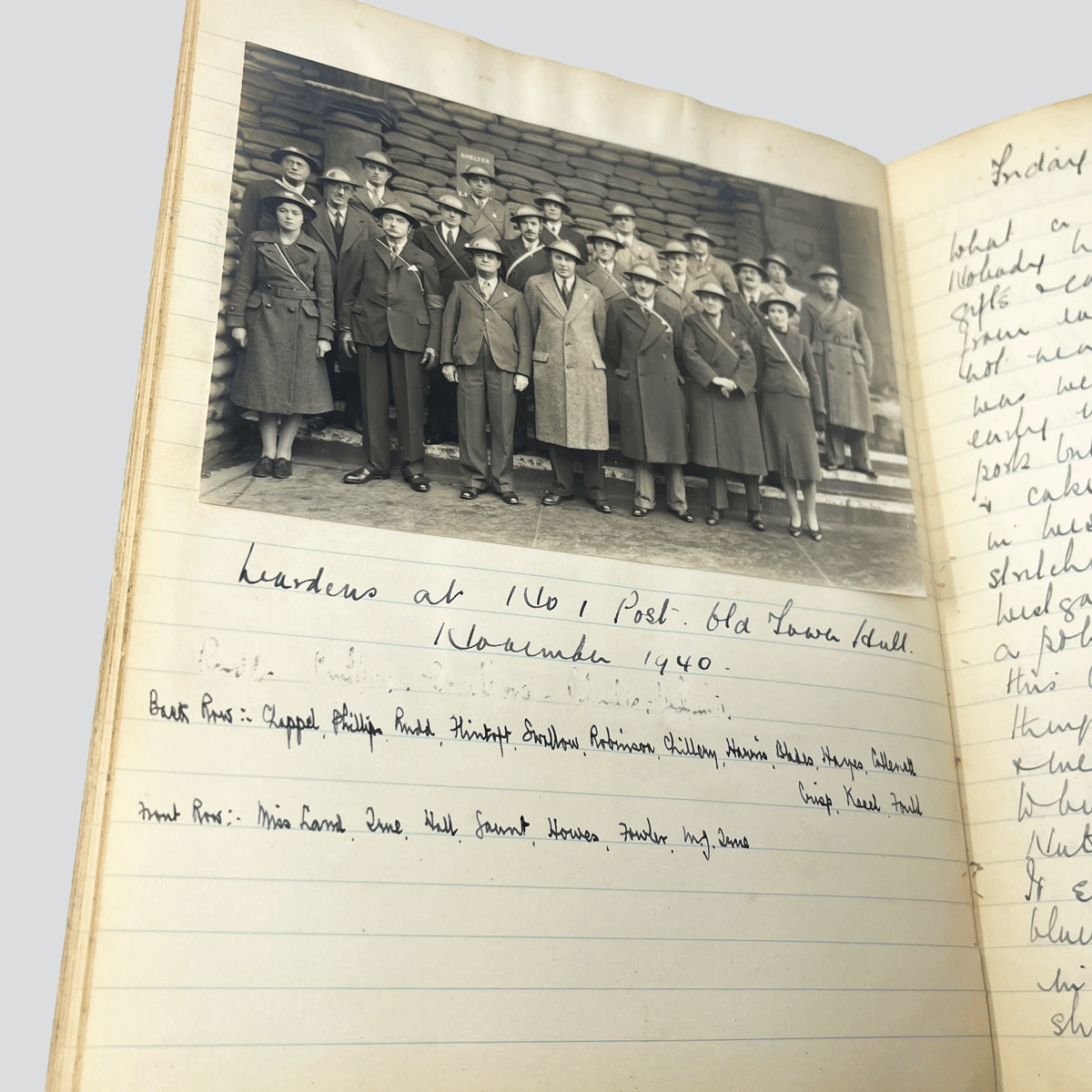 Image 22 of 32
Image 22 of 32

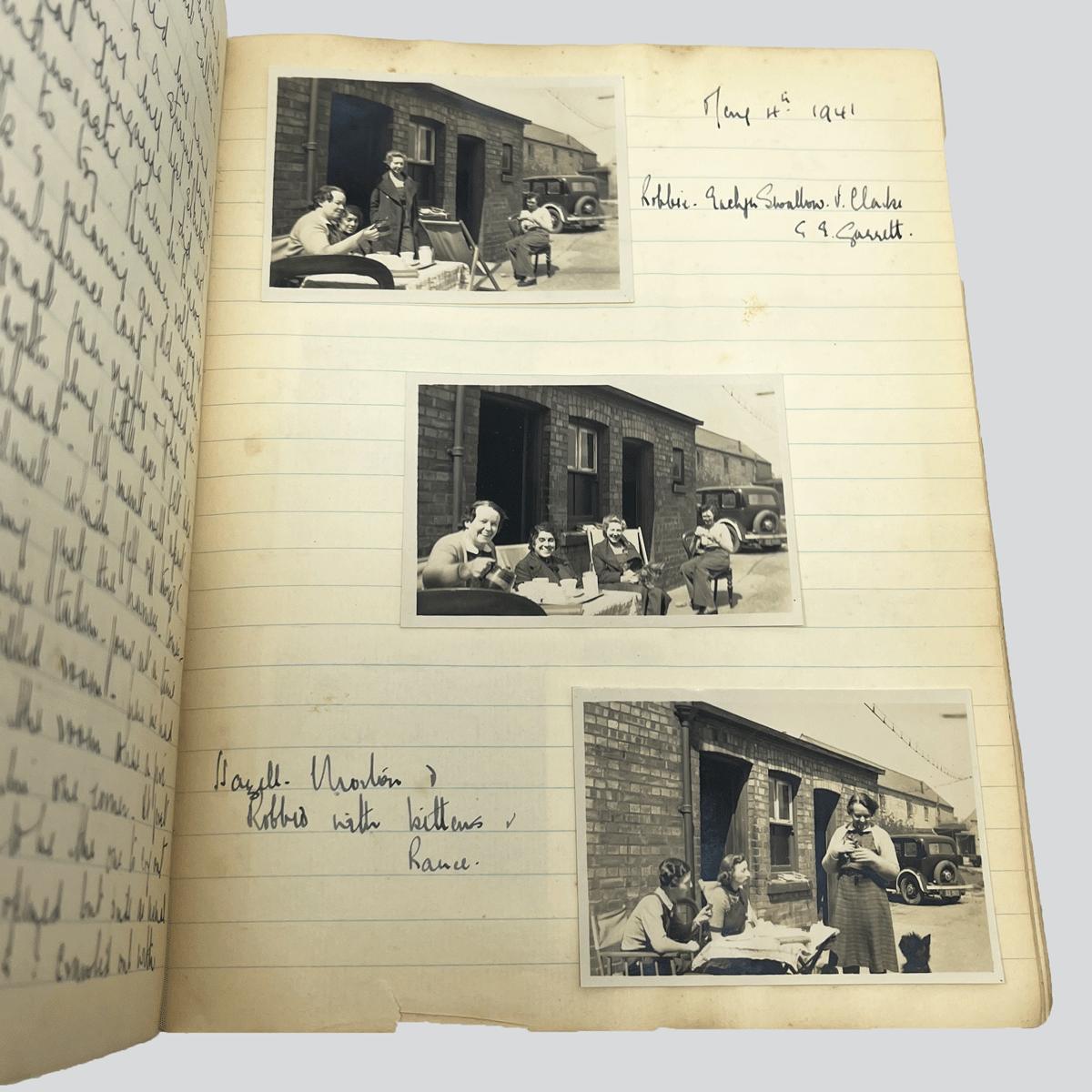 Image 23 of 32
Image 23 of 32

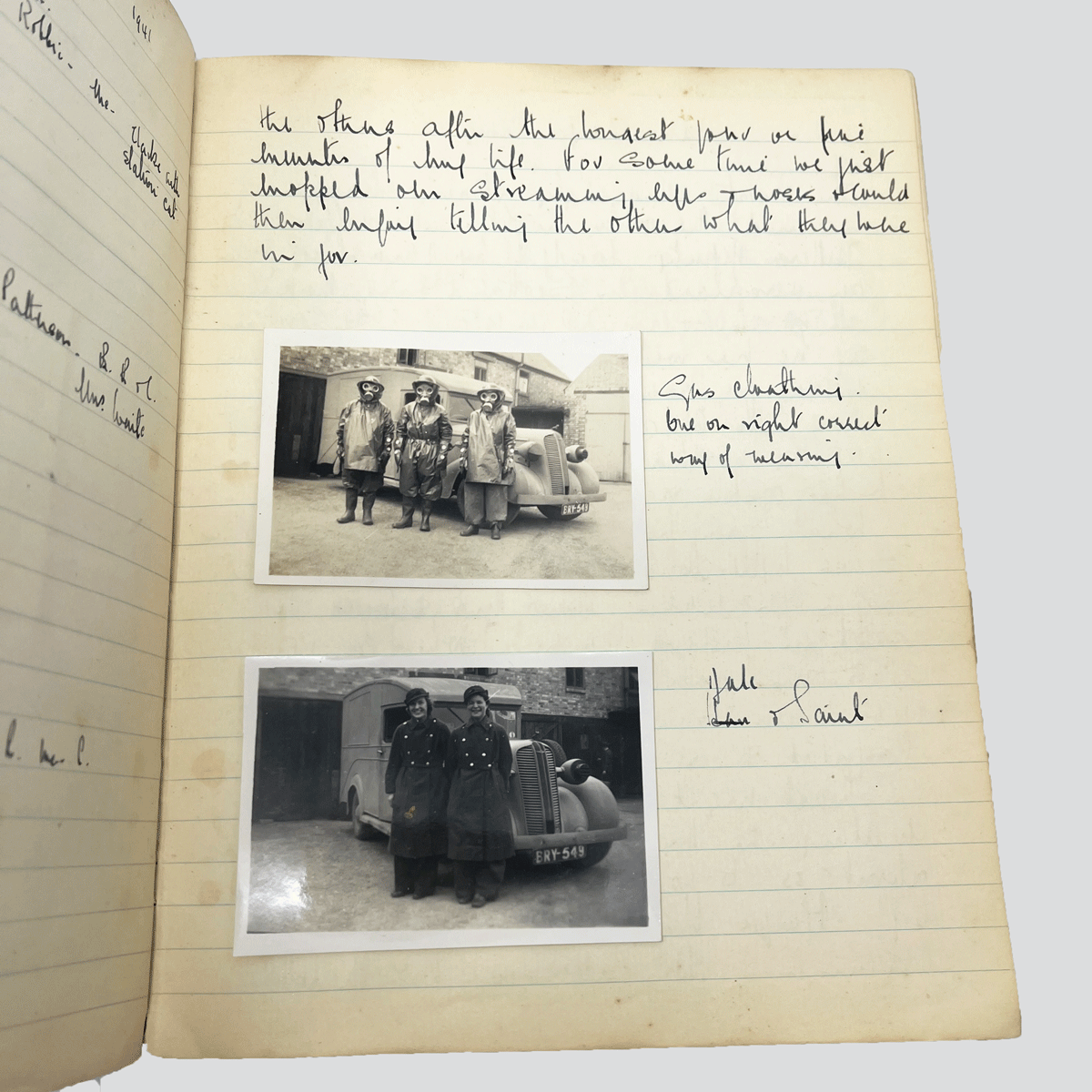 Image 24 of 32
Image 24 of 32

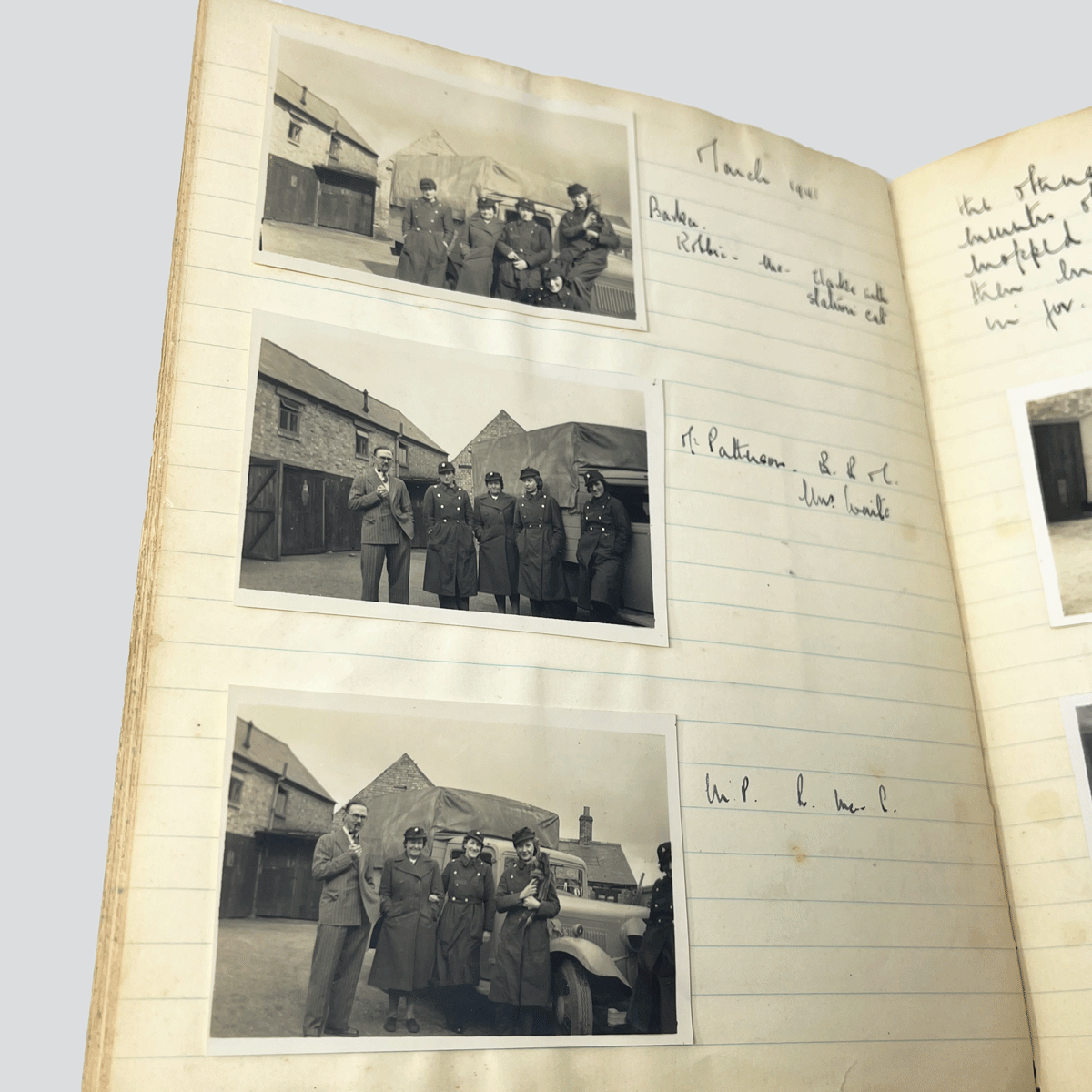 Image 25 of 32
Image 25 of 32

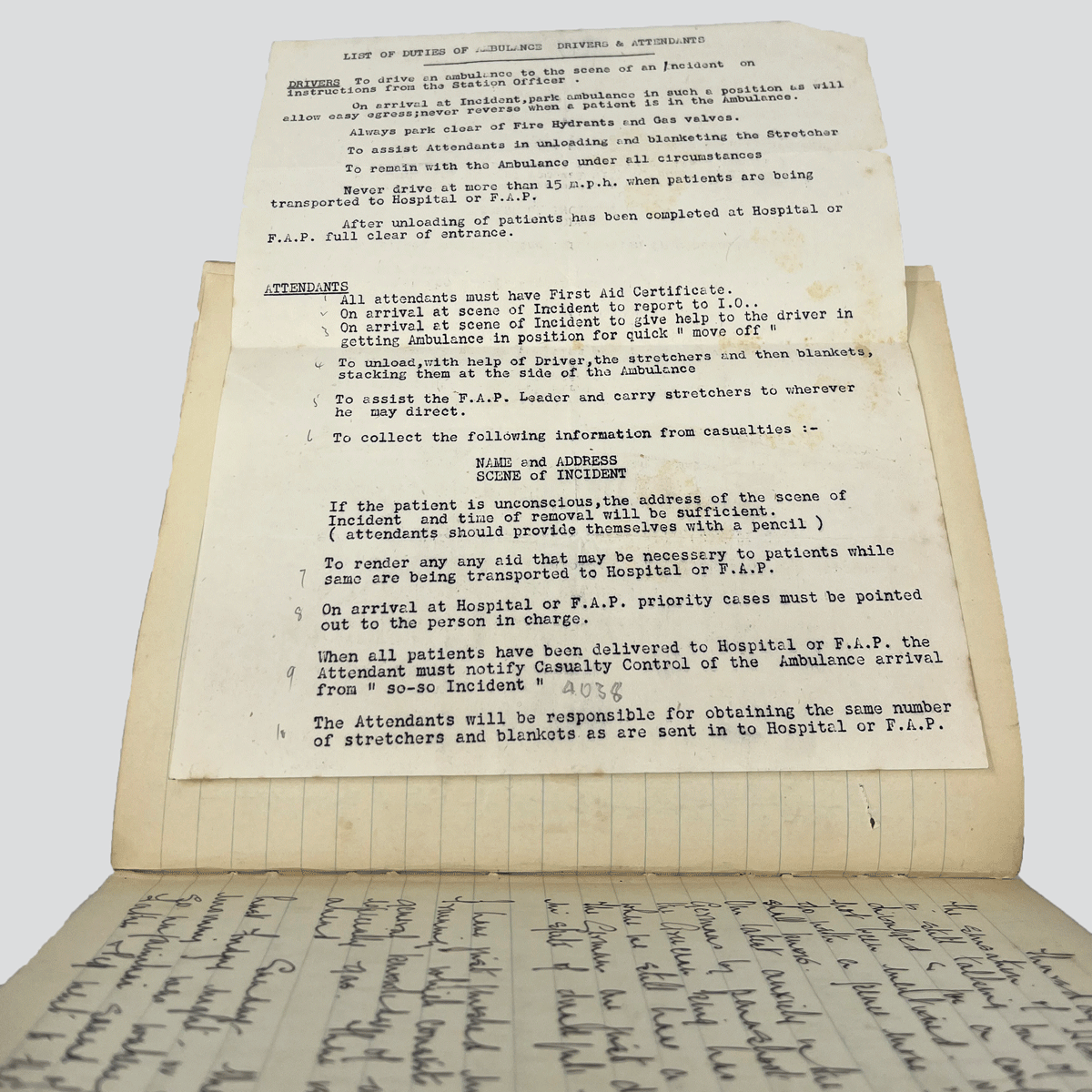 Image 26 of 32
Image 26 of 32

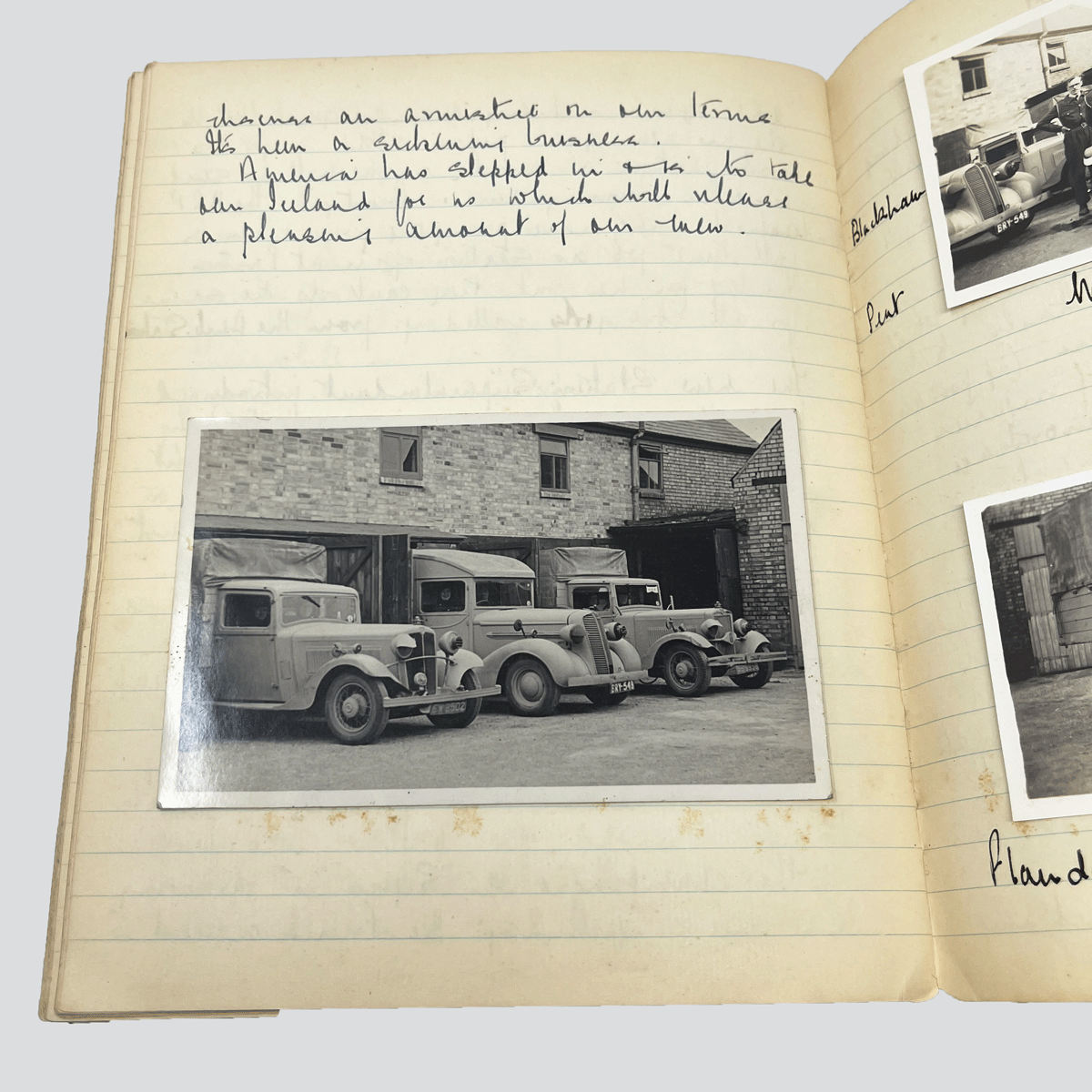 Image 27 of 32
Image 27 of 32

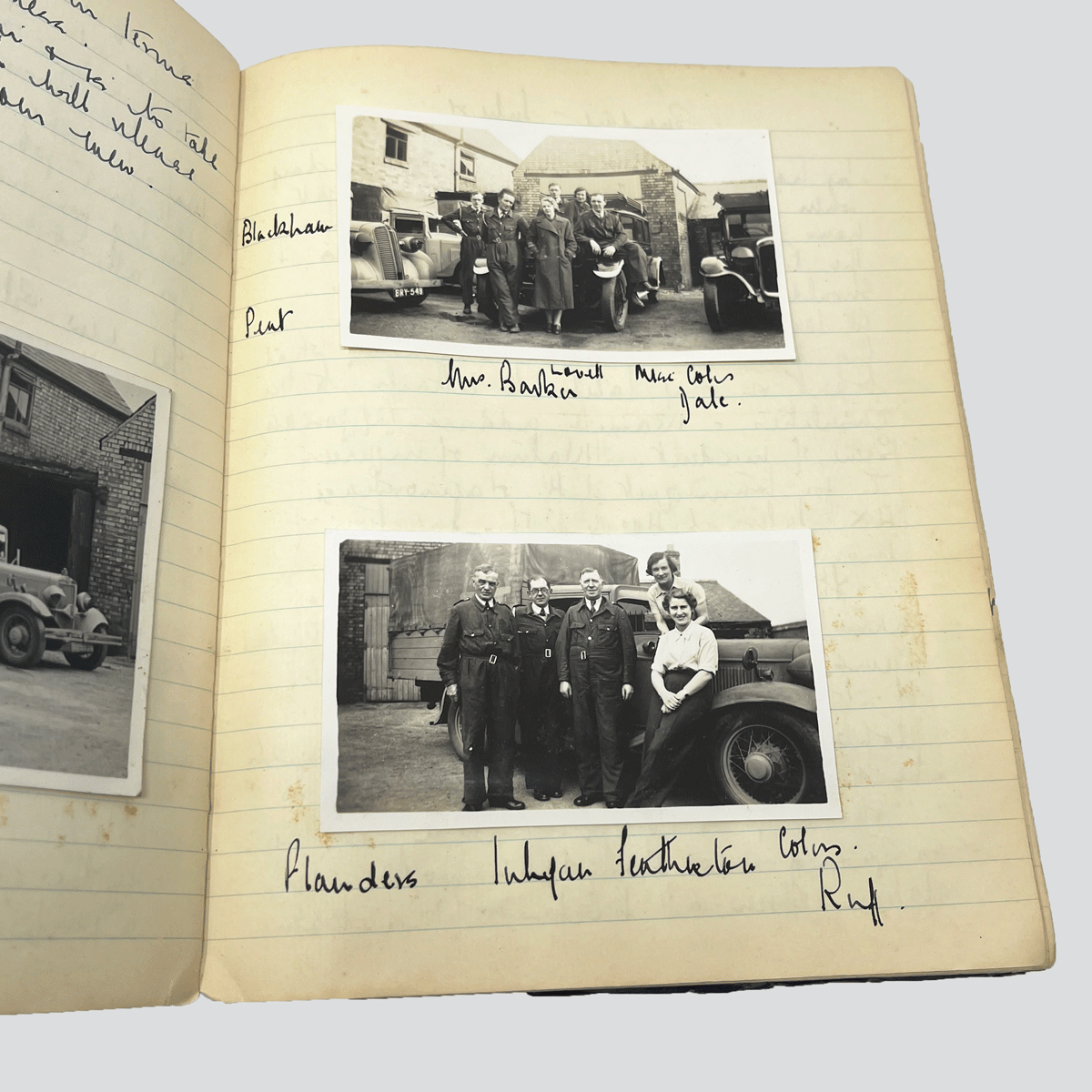 Image 28 of 32
Image 28 of 32

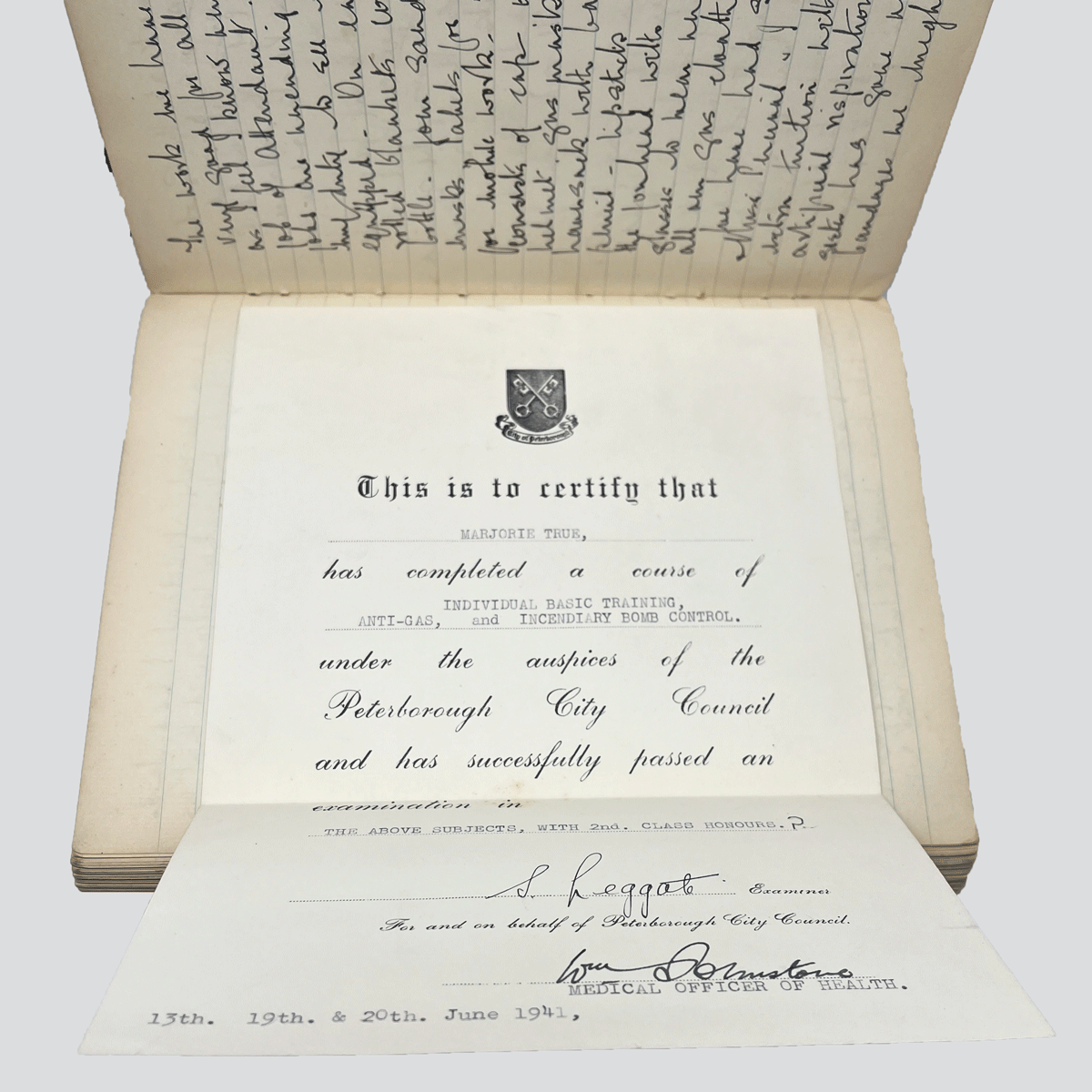 Image 29 of 32
Image 29 of 32

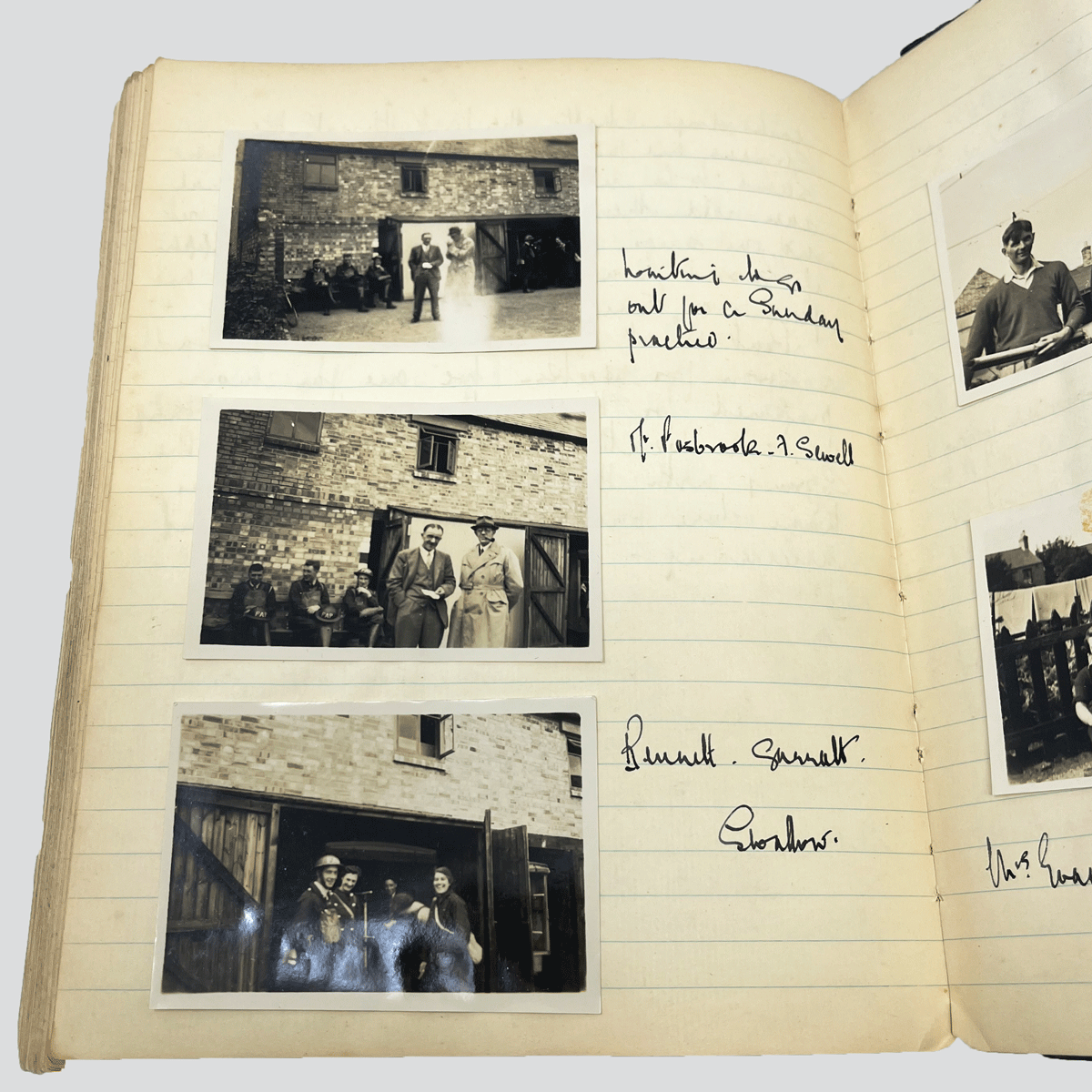 Image 30 of 32
Image 30 of 32

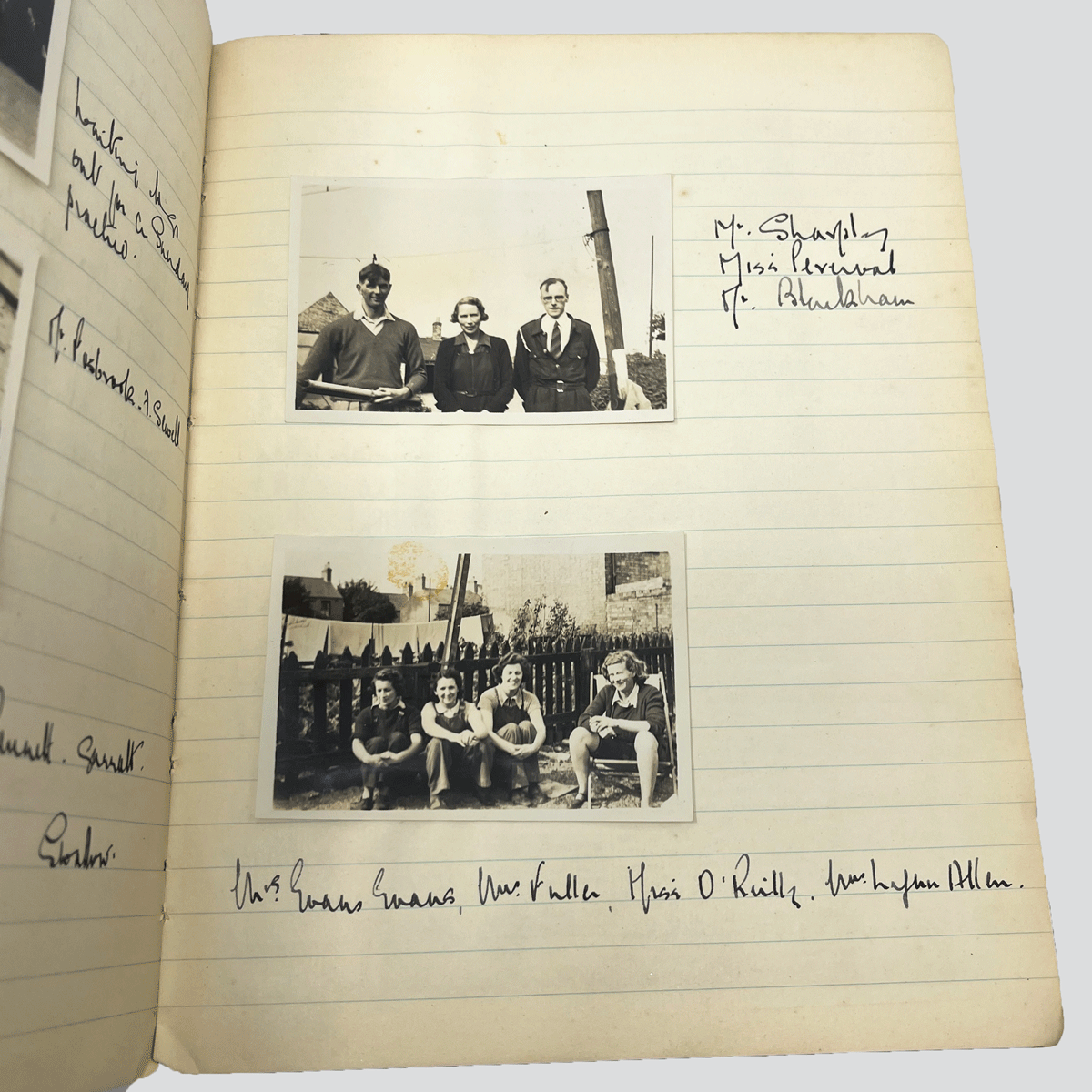 Image 31 of 32
Image 31 of 32

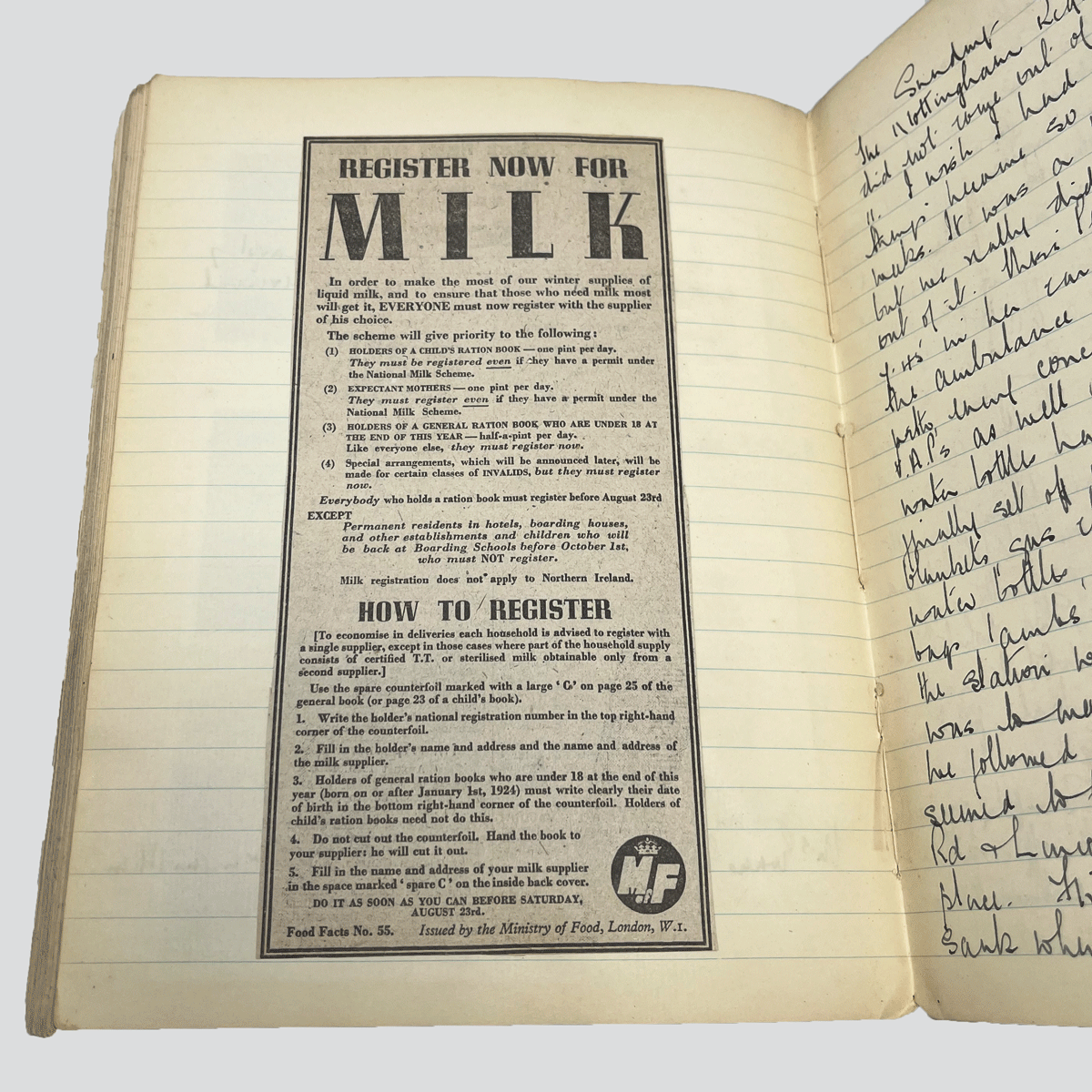 Image 32 of 32
Image 32 of 32

































A unique World War Two Journal compiled by Marjorie True between 1939-1941.
A unique journal compiled by Marjorie True between 1939-1941, providing a detailed account of her time working as an ambulance driver’s attendant in Peterborough for the Women’s Voluntary Service and her experiences of war on the Home Front. The journal provides a wealth of information about Marjorie’s voluntary work; her training sessions and practice exercises, experiences of nights working, the other volunteers she interacted with, and her social activities. Marjorie records international events and developments, public and private sentiments, air raids and her experiences of consequent measures such as blackouts. Marjorie’s perspective and experiences of the Blitz and the Battle of Britain is also covered in the journal. A special survival from WWII providing a fascinating account of a woman’s experience of war and an important historical record of the vital work undertaken by female ambulance workers helping those in need; a function of the Women’s Voluntary Service which is lacking in primary source information.
4to (23*17cm), original buckram-backed boards, 227 pages extensively filled with manuscript text; Marjorie’s ownership inscription to front pastedown; 66 photographs in total with 60 secured to pages of the journal and 6 loosely inserted; a variety of other interesting material secured to some pages such as a pamphlet to 'Register now for Milk', 8 newspaper clippings, a 1939 typed letter to Marjorie from the “Women’s Voluntary Services For Civil Defence”, a 1 page typed document entitled “List Of Duties Of Ambulance Drivers & Attendants”, a 1941 Certificate to “certify that Marjorie True, has completed a course of Individual Basic Training, Anti-Gas, and Incendiary Bomb Control. under the auspices of the Peterborough City Council and has successfully passed an examination in The Above Subjects, with 2nd. Class honours.”
Some wear to the binding, gutter cracking in places but holding firm, the occasional minor spot and minor blemish, tiny holes to two pages with loss to a couple of letters of text without any loss of meaning; very good.
A wealth of additional material is loosely inserted such as a birthday card to Marjorie signed by her fellow volunteers, Marjorie’s 1942-43 clothing ration book, Marjorie’s 1942 Certificate of Registration for Civil Defence Duties issued by the city of Peterborough, a 7pp. pamphlet entitled 'A Message to the Home Guard' by John Langdon-Davies, a letter from J.H. Plaistow asking Marjorie to report to the old town hall for orders, a 1 page letter in response to an advert by Marjorie for a housekeeper, a handwritten poem by Marjorie on Christmas Day 1939.
A loosely inserted three page letter from Mary Jervis to Marjorie reveals that Marjorie had a Chiropody practice in Peterborough during the war. The letter is annotated by Marjorie who says of Mary: “She left during the war to nurse & did a very fine job. She was a grand girl ..... I would love to meet her again.” The letter reveals Mary’s hard and harrowing work as a nurse, alongside preparing for her Preliminary State Exam and mentions the direct hit suffered by the empty school building next door to the Nurse’s Home - “we had a wonderful “let off” recently”, explains Mary.
On Sunday March 23rd (1941), Marjorie records the impact of the war on her Chiropody practice:
“The latest shock is the news that all girls of 20 to 22 must register for National Service on April 17th. After which they will be interviewed & put to the most likely work - munitions - farm or the Auxiliary Services. Mary Jervis is 20 and my new receptionist (?) 22 so both will have to register. Mary is lame with hip trouble so may be able to keep her if we play our cards carefully. I cannot think what I shall do if they both have to go as we are terribly busy now. Its no good worrying - I’ll just wait & see what happens.”
The journal contains extensive entries relating to Marjorie’s experiences as an ambulance driver’s attendant. On Sunday Sept 17 (1939), she writes:
“Here things are getting rather slack. We feel Hitler cannot bother with us until Poland is finished. Already people are forgetting their gas masks & there is a rather loud air amongst the many so called “voluntary” helpers. I say “so called” because so many of them are being paid ..... I was called to the Ambulance Station last Friday and stayed there from 7 to 10.20. For this I get nothing however many times I do it after my day’s work. The whole idea of payment is pernicious and should only be allowed in singular cases. The government do go crackers in some cases.”
On Friday Aug 22nd (1940), she records in the journal:
“We have had two ghastly long stretches at the station two nights running this week. So Mrs Plaistow has given me a night off tonight. It will be fine to go to bed & feel I have not got to keep one ear open for the siren - flung myself into slacks & jumper & cycle off into the night.
I had a very nice time in Stroud with old Mrs … in spite of the fact that bombs were dropping round us night & day.”
On Thursday May 22nd (1941), she discusses some training she has been undertaking:
“I have just finished my course on “Rusie Training” which consists of a kind of general knowledge of all A.R.P. matters - especially gas. There is an exam looming ahead.”
Thursday Oct 10th :
“For a town like this where bombs are the exception not the rule the strain is not good, but in London and other big towns which are visited most nights the prospect must be grim. ........the Londoners who can have evacuated but .......many cannot stay away for long. I am getting quite a number of these people in for treatment & their stories are terribly harrowing. In Walthamstow for instance two land mines were dropped & whole rows of houses simply raised to the ground. Pictures show pathetic Anderson Shelters blown about like so much newspaper on a windy day. These shelters have proved their worth but they cannot stand up to direct hits or blasts such as land mines give.”
Saturday Night June 21st (1941):
“We are all wondering why we are having such peace from the German Air Force. The nights have been ideal but apart from small bombings we have all slept peacefully now for some time. True there have been odd sirens but nothing more. Tonight is my night on. One always wonders if it is tonight our blitz may come. If only Diana Barker (?) was here to hold the fort with me I should almost enjoy these nights on duty. As it is there is no one in my own shift who is a kindred spirit - Tonight I shall spend with Mrs ..... who is common through & through but who is doing her job at the A.S., after working until 10pm very often. Pity there are not more like her. We have nothing in common in the way of conversation so sitting up all night becomes somewhat tedious. D.B. and I used to discuss books & plays & she would tell me about ballet and interesting things to do with dancers training.”
Marjorie records a royal visit on Wednesday Sept 13th :
“Last Monday was quite an important day for me as I was one of the four ambulance attendants to be presented to the Duchess of Gloucester when she came to inspect the Nursing division & first aid posts…. The Duchess came to each one of us & shook hands Mrs Plaistow presenting each in turn. We all had to drop a curtesy which must have looked comic in our get up.
On the whole my impression of the Duchess was disappointing. She has a charming little face but had no colour and really looked ill… Tonight I go to do my first two hour relief duty at the ambulance station.”
Marjorie records her experiences in the journal during the Blitz. On Sept 9th Sunday (1940), she writes:
“London is having a terrible time now. Yesterday was the worst raid of all & so far we do not know all the damage & loss of life but it is known that 400 were killed outright. Planes came over in daylight and start which make things easy for the next wave after dark. In the raid yesterday there were 500 enemy planes in wave after wave. Compared with many towns we in Peterborough are living in peace. We know nothing of the actual horrors that are going on even a few miles away. We most certainly should not grumble about getting up for sirens alone.”
A few days later on Saturday Sept 14th she writes:
“London has suffered terribly - & not only London. The Docks have been the chief target but Buckingham Palace received its first & lets hope last bomb the other night. There have been marvellous tales of courage shown by all helpers & the victims too.”
Marjorie offers some poignant new year reflection on Sunday Jan 7th (1940):
“Well our first war Christmas & New Year are over. Most people breathed a sigh of relief - the spirit of the country is entirely different in this year from the last. Not that I mean we are meeting it in poor spirit - only the realisation of all it means is greater this time - we know we are fighting for our lives. German hatred of England and the English is far more intense than against the Scotch, Irish or Welsh.”
Marjorie provides an interesting insight into her perspective on conscious objectors, writing on Jan 28th (1940):
“Young Gillibrand - the P.T. Master from Kings School came in ..... this afternoon......as conscious objectors he is one of the most sincere. He is willing to serve in any way but taking life. He offered to join the Merchant Navy, which at this moment is one of the worst jobs going. The trawlers are being sunk without mercy & then usually machined gunned as they leave the sinking ship. There has been a most poisonous letter in the paper about a Kings Master registering as an objector......may a schoolmaster not have a conscience?.........Gillibrand is such a smart youth, actually with no scrap of cowardice about him. Last year he tramped right across Lapland. There is far too much petty criticism going around these days.”
Marjorie records her interactions with other female volunteers and some of the social activities they engaged in. For example, on Feb 17th (1941):
“We had our party last night & I think it was quite a success. I got awfully worried as the time drew near because it was really my responsibility. Evelyn Swallow was very good and turned up first & with help from Mrs E… we were all ready at 7.15.
We arranged two lettuce leaves in some shallow soup bowls - then a pile of chipsticks. This was edged with watercress. Across the top we layed a half bridge roll thickly spread with lobster paste to hide the deficiency of butter. On another plate we had some extra bridge rolls already paste spread. For our second course we had tiny sultana scones cut in half with a dab of jam on each piece - also jam tarts. We then had a flat .......... basket handed round with quartered apples and carrots - this ... went very well - especially the carrots. To finish up we had small cups of coffee. After we had cleaned up all the debris we started on games .... At 10.45 we had to bunk up as eight of us were due on at the Ambulance Station at 11pm.”
Over the course of the journal Marjorie records in detail international developments and events as they unfold. For example, on Monday Oct 1st (1939) she writes:
“Mr Churchill spoke last night on the first month of war. He was refreshing to listen to. Wish there were more like him. Although not unduly optimistic he certainly cheered me up. He is of course First Lord of the Admiralty and how the Nazis hate him.”
Sunday Jan 21st (1940):
“The Finns are having terrible raids now...........a thousand bombs have been dropped to-day.”
Wednesday May 15th (1940):
“To-day the Dutch army have layed down their arms. Only a week ago they were a free people. The Queen, government - Princess Juliana & children are all in England. The Belgians, led by the King are fighting grimly but courage can do so little against these hoards. We are expecting a mighty battle at Brussels where the allies have joined the Belgians. It may well be that the whole course of the war may be changed by the result.”
“Mr Chamberlain has been superseded by Mr Churchill as Prime Minister. Perhaps a change for the good but he has done well and is now shouldering blame that should ......be layed on him. If he had fallen into the Norway trap and sent thousands of our troops there where should we be now?”
Sunday May 19th (1940):
“The war is getting very close now. There is a terrible melee taking place round the Sedan area on the French Belgian frontier - the Germans have penetrated about 60 odd miles into France. They have brought out some super heavy tanks which have gone through the weakest point of the Maginot line.... .All are told to be on the look out for parachutists who are now landing with transparent parachutes & dressed in sky blue. They come down also in allies uniforms......”
Saturday Aug 3rd (1940):
“Hitler dropped leaflets the other night with “A Last Appeal to Reason”. They have caused much amusement in Britain and one workman(?) has raised £2 by selling them in aid of the Red X.”
Thursday Oct 10th (1940):
“Japan has formed an alliance with Germany & Italy so all things considered we are again going to close the Burma Road which was only opened to conciliate them. America is more & more with us - is in fact our great stand by. The first batch of pilots finished in Canada where they can train unhampered by ...... has arrived back in England. Great squadrons(?) are being prepared all over Canada.”
March 15th :
“This week America has at last signed her “Lease & Lend” Bill which will mean almost unlimited help to Britain. It must come quickly.”
Wednesday May 14 (1941):
“The most amazingly strange happening occurred the other night. Rudolph Hess - Hitler’s Deputy landed by parashoot from an aeroplane in Scotland. At the moment all is shrouded in mystery. The Germans say he has lost his reason & has been going insane for some time but after an examination here by doctors he was pronounced perfectly normal - apart from the injury to his ankle received when he landed. What can be the meaning of it? There seems little doubt now that he has come as a fugitive. But this shows a split in Hitler’s ..... Whatever it is it is no good to Germany. He has now been transferred from the Glasgow hospital to an unknown destination.”
Sunday May 25th (1941):
“The worst news we have had for may weeks came today - or rather last night when we learn that the Hood - our largest battleship has sunk with - it is feared - very few survivors. An unlucky shot hit the magazine and she blew up.”
Sunday July 27th (1941):
“Russia is still hanging on & the second German offensive is already beginning to fade. America & Britain - with Colonies have frozen Japans interests in retaliation for Japans taking our bases in Indo China.”
Wednesday Oct 8th:
“The Russians are fighting grimly but the news grows more worrying each day. With the last thrust the Germans are 150 mile from Moscow. There seems to be nothing on God’s earth that can hold them. We are all fearful but no one says a word of what will happen if Russia cracks up. The Nazis too are facing a terrible winter in any case.”
“But what a rest we have had. Hardly a siren for weeks. We are far more prepared for things this winter so if only we can weather it we may greet the Spring with the feeling that what we have done once we can do again if necessary.”
Please contact us for shipping costs if ordering from outside the UK.
A unique journal compiled by Marjorie True between 1939-1941, providing a detailed account of her time working as an ambulance driver’s attendant in Peterborough for the Women’s Voluntary Service and her experiences of war on the Home Front. The journal provides a wealth of information about Marjorie’s voluntary work; her training sessions and practice exercises, experiences of nights working, the other volunteers she interacted with, and her social activities. Marjorie records international events and developments, public and private sentiments, air raids and her experiences of consequent measures such as blackouts. Marjorie’s perspective and experiences of the Blitz and the Battle of Britain is also covered in the journal. A special survival from WWII providing a fascinating account of a woman’s experience of war and an important historical record of the vital work undertaken by female ambulance workers helping those in need; a function of the Women’s Voluntary Service which is lacking in primary source information.
4to (23*17cm), original buckram-backed boards, 227 pages extensively filled with manuscript text; Marjorie’s ownership inscription to front pastedown; 66 photographs in total with 60 secured to pages of the journal and 6 loosely inserted; a variety of other interesting material secured to some pages such as a pamphlet to 'Register now for Milk', 8 newspaper clippings, a 1939 typed letter to Marjorie from the “Women’s Voluntary Services For Civil Defence”, a 1 page typed document entitled “List Of Duties Of Ambulance Drivers & Attendants”, a 1941 Certificate to “certify that Marjorie True, has completed a course of Individual Basic Training, Anti-Gas, and Incendiary Bomb Control. under the auspices of the Peterborough City Council and has successfully passed an examination in The Above Subjects, with 2nd. Class honours.”
Some wear to the binding, gutter cracking in places but holding firm, the occasional minor spot and minor blemish, tiny holes to two pages with loss to a couple of letters of text without any loss of meaning; very good.
A wealth of additional material is loosely inserted such as a birthday card to Marjorie signed by her fellow volunteers, Marjorie’s 1942-43 clothing ration book, Marjorie’s 1942 Certificate of Registration for Civil Defence Duties issued by the city of Peterborough, a 7pp. pamphlet entitled 'A Message to the Home Guard' by John Langdon-Davies, a letter from J.H. Plaistow asking Marjorie to report to the old town hall for orders, a 1 page letter in response to an advert by Marjorie for a housekeeper, a handwritten poem by Marjorie on Christmas Day 1939.
A loosely inserted three page letter from Mary Jervis to Marjorie reveals that Marjorie had a Chiropody practice in Peterborough during the war. The letter is annotated by Marjorie who says of Mary: “She left during the war to nurse & did a very fine job. She was a grand girl ..... I would love to meet her again.” The letter reveals Mary’s hard and harrowing work as a nurse, alongside preparing for her Preliminary State Exam and mentions the direct hit suffered by the empty school building next door to the Nurse’s Home - “we had a wonderful “let off” recently”, explains Mary.
On Sunday March 23rd (1941), Marjorie records the impact of the war on her Chiropody practice:
“The latest shock is the news that all girls of 20 to 22 must register for National Service on April 17th. After which they will be interviewed & put to the most likely work - munitions - farm or the Auxiliary Services. Mary Jervis is 20 and my new receptionist (?) 22 so both will have to register. Mary is lame with hip trouble so may be able to keep her if we play our cards carefully. I cannot think what I shall do if they both have to go as we are terribly busy now. Its no good worrying - I’ll just wait & see what happens.”
The journal contains extensive entries relating to Marjorie’s experiences as an ambulance driver’s attendant. On Sunday Sept 17 (1939), she writes:
“Here things are getting rather slack. We feel Hitler cannot bother with us until Poland is finished. Already people are forgetting their gas masks & there is a rather loud air amongst the many so called “voluntary” helpers. I say “so called” because so many of them are being paid ..... I was called to the Ambulance Station last Friday and stayed there from 7 to 10.20. For this I get nothing however many times I do it after my day’s work. The whole idea of payment is pernicious and should only be allowed in singular cases. The government do go crackers in some cases.”
On Friday Aug 22nd (1940), she records in the journal:
“We have had two ghastly long stretches at the station two nights running this week. So Mrs Plaistow has given me a night off tonight. It will be fine to go to bed & feel I have not got to keep one ear open for the siren - flung myself into slacks & jumper & cycle off into the night.
I had a very nice time in Stroud with old Mrs … in spite of the fact that bombs were dropping round us night & day.”
On Thursday May 22nd (1941), she discusses some training she has been undertaking:
“I have just finished my course on “Rusie Training” which consists of a kind of general knowledge of all A.R.P. matters - especially gas. There is an exam looming ahead.”
Thursday Oct 10th :
“For a town like this where bombs are the exception not the rule the strain is not good, but in London and other big towns which are visited most nights the prospect must be grim. ........the Londoners who can have evacuated but .......many cannot stay away for long. I am getting quite a number of these people in for treatment & their stories are terribly harrowing. In Walthamstow for instance two land mines were dropped & whole rows of houses simply raised to the ground. Pictures show pathetic Anderson Shelters blown about like so much newspaper on a windy day. These shelters have proved their worth but they cannot stand up to direct hits or blasts such as land mines give.”
Saturday Night June 21st (1941):
“We are all wondering why we are having such peace from the German Air Force. The nights have been ideal but apart from small bombings we have all slept peacefully now for some time. True there have been odd sirens but nothing more. Tonight is my night on. One always wonders if it is tonight our blitz may come. If only Diana Barker (?) was here to hold the fort with me I should almost enjoy these nights on duty. As it is there is no one in my own shift who is a kindred spirit - Tonight I shall spend with Mrs ..... who is common through & through but who is doing her job at the A.S., after working until 10pm very often. Pity there are not more like her. We have nothing in common in the way of conversation so sitting up all night becomes somewhat tedious. D.B. and I used to discuss books & plays & she would tell me about ballet and interesting things to do with dancers training.”
Marjorie records a royal visit on Wednesday Sept 13th :
“Last Monday was quite an important day for me as I was one of the four ambulance attendants to be presented to the Duchess of Gloucester when she came to inspect the Nursing division & first aid posts…. The Duchess came to each one of us & shook hands Mrs Plaistow presenting each in turn. We all had to drop a curtesy which must have looked comic in our get up.
On the whole my impression of the Duchess was disappointing. She has a charming little face but had no colour and really looked ill… Tonight I go to do my first two hour relief duty at the ambulance station.”
Marjorie records her experiences in the journal during the Blitz. On Sept 9th Sunday (1940), she writes:
“London is having a terrible time now. Yesterday was the worst raid of all & so far we do not know all the damage & loss of life but it is known that 400 were killed outright. Planes came over in daylight and start which make things easy for the next wave after dark. In the raid yesterday there were 500 enemy planes in wave after wave. Compared with many towns we in Peterborough are living in peace. We know nothing of the actual horrors that are going on even a few miles away. We most certainly should not grumble about getting up for sirens alone.”
A few days later on Saturday Sept 14th she writes:
“London has suffered terribly - & not only London. The Docks have been the chief target but Buckingham Palace received its first & lets hope last bomb the other night. There have been marvellous tales of courage shown by all helpers & the victims too.”
Marjorie offers some poignant new year reflection on Sunday Jan 7th (1940):
“Well our first war Christmas & New Year are over. Most people breathed a sigh of relief - the spirit of the country is entirely different in this year from the last. Not that I mean we are meeting it in poor spirit - only the realisation of all it means is greater this time - we know we are fighting for our lives. German hatred of England and the English is far more intense than against the Scotch, Irish or Welsh.”
Marjorie provides an interesting insight into her perspective on conscious objectors, writing on Jan 28th (1940):
“Young Gillibrand - the P.T. Master from Kings School came in ..... this afternoon......as conscious objectors he is one of the most sincere. He is willing to serve in any way but taking life. He offered to join the Merchant Navy, which at this moment is one of the worst jobs going. The trawlers are being sunk without mercy & then usually machined gunned as they leave the sinking ship. There has been a most poisonous letter in the paper about a Kings Master registering as an objector......may a schoolmaster not have a conscience?.........Gillibrand is such a smart youth, actually with no scrap of cowardice about him. Last year he tramped right across Lapland. There is far too much petty criticism going around these days.”
Marjorie records her interactions with other female volunteers and some of the social activities they engaged in. For example, on Feb 17th (1941):
“We had our party last night & I think it was quite a success. I got awfully worried as the time drew near because it was really my responsibility. Evelyn Swallow was very good and turned up first & with help from Mrs E… we were all ready at 7.15.
We arranged two lettuce leaves in some shallow soup bowls - then a pile of chipsticks. This was edged with watercress. Across the top we layed a half bridge roll thickly spread with lobster paste to hide the deficiency of butter. On another plate we had some extra bridge rolls already paste spread. For our second course we had tiny sultana scones cut in half with a dab of jam on each piece - also jam tarts. We then had a flat .......... basket handed round with quartered apples and carrots - this ... went very well - especially the carrots. To finish up we had small cups of coffee. After we had cleaned up all the debris we started on games .... At 10.45 we had to bunk up as eight of us were due on at the Ambulance Station at 11pm.”
Over the course of the journal Marjorie records in detail international developments and events as they unfold. For example, on Monday Oct 1st (1939) she writes:
“Mr Churchill spoke last night on the first month of war. He was refreshing to listen to. Wish there were more like him. Although not unduly optimistic he certainly cheered me up. He is of course First Lord of the Admiralty and how the Nazis hate him.”
Sunday Jan 21st (1940):
“The Finns are having terrible raids now...........a thousand bombs have been dropped to-day.”
Wednesday May 15th (1940):
“To-day the Dutch army have layed down their arms. Only a week ago they were a free people. The Queen, government - Princess Juliana & children are all in England. The Belgians, led by the King are fighting grimly but courage can do so little against these hoards. We are expecting a mighty battle at Brussels where the allies have joined the Belgians. It may well be that the whole course of the war may be changed by the result.”
“Mr Chamberlain has been superseded by Mr Churchill as Prime Minister. Perhaps a change for the good but he has done well and is now shouldering blame that should ......be layed on him. If he had fallen into the Norway trap and sent thousands of our troops there where should we be now?”
Sunday May 19th (1940):
“The war is getting very close now. There is a terrible melee taking place round the Sedan area on the French Belgian frontier - the Germans have penetrated about 60 odd miles into France. They have brought out some super heavy tanks which have gone through the weakest point of the Maginot line.... .All are told to be on the look out for parachutists who are now landing with transparent parachutes & dressed in sky blue. They come down also in allies uniforms......”
Saturday Aug 3rd (1940):
“Hitler dropped leaflets the other night with “A Last Appeal to Reason”. They have caused much amusement in Britain and one workman(?) has raised £2 by selling them in aid of the Red X.”
Thursday Oct 10th (1940):
“Japan has formed an alliance with Germany & Italy so all things considered we are again going to close the Burma Road which was only opened to conciliate them. America is more & more with us - is in fact our great stand by. The first batch of pilots finished in Canada where they can train unhampered by ...... has arrived back in England. Great squadrons(?) are being prepared all over Canada.”
March 15th :
“This week America has at last signed her “Lease & Lend” Bill which will mean almost unlimited help to Britain. It must come quickly.”
Wednesday May 14 (1941):
“The most amazingly strange happening occurred the other night. Rudolph Hess - Hitler’s Deputy landed by parashoot from an aeroplane in Scotland. At the moment all is shrouded in mystery. The Germans say he has lost his reason & has been going insane for some time but after an examination here by doctors he was pronounced perfectly normal - apart from the injury to his ankle received when he landed. What can be the meaning of it? There seems little doubt now that he has come as a fugitive. But this shows a split in Hitler’s ..... Whatever it is it is no good to Germany. He has now been transferred from the Glasgow hospital to an unknown destination.”
Sunday May 25th (1941):
“The worst news we have had for may weeks came today - or rather last night when we learn that the Hood - our largest battleship has sunk with - it is feared - very few survivors. An unlucky shot hit the magazine and she blew up.”
Sunday July 27th (1941):
“Russia is still hanging on & the second German offensive is already beginning to fade. America & Britain - with Colonies have frozen Japans interests in retaliation for Japans taking our bases in Indo China.”
Wednesday Oct 8th:
“The Russians are fighting grimly but the news grows more worrying each day. With the last thrust the Germans are 150 mile from Moscow. There seems to be nothing on God’s earth that can hold them. We are all fearful but no one says a word of what will happen if Russia cracks up. The Nazis too are facing a terrible winter in any case.”
“But what a rest we have had. Hardly a siren for weeks. We are far more prepared for things this winter so if only we can weather it we may greet the Spring with the feeling that what we have done once we can do again if necessary.”
Please contact us for shipping costs if ordering from outside the UK.
